#both of the in story related reasons (positive) and translation related reasons (negative)
Explore tagged Tumblr posts
Text
i once again don't know whether to laugh or cry about the shittiest quality of the locked tomb russian translation
when i just think, hey, maybe they got better on the third book, finally (they did not), i get to a point when they translate someone's "dead best friend" to "dead girl best friend" for no reason at all
i think, okay, maybe that's the worst they can do this time
only to get to a page when it feels like a line just straight up missing. and that time actually because of censorship, self censorship most likely (because why else? this series barely has media coverage im pretty sure, unlike tgcf, for example, and isn't done by the main wing of the publishing house that most people would pay attention to, and for fucks sake there are still mdzs books being printed out with full on gay sex in them, why the fuck anyone would care about one throw away line of text)
so i look up the book in english, find this page, learn that yes, they literally took out like 5 words in total

but then left everything else in? not even edited in gracefully in any way, rephrased it, but also when the fuck did they do anything gracefully about this translation, creating a page of text that made just NO fucking sense
and the thing is they really did leave everything else, meaning here

nona said in russian, "you could have said you were my girl-friend" not to mix with girlfriend, the meaning was left to be ambiguous, which is why that is exactly what they could have done IN THE FIRST PLACE?? but instead they had to add a word to a sentence that didn't even have the word originally, because they couldn't figure out the simpliest translation puzzle, but you know what, that makes total sense, because you know what else i learnt reading this page?
right before all that there is a short paragraph about the dog

which is how i learnt for the first time ever after having finished almost half of the book that THE DOG IS A BOY
THE STUPID IDIOTS HAVE BEEN MISGENDERING THE DOG THE ENTIRE FUCKING BOOK
?????????????????? i cannot even phantom WHY. other than they figured saying she would make more sense with how they translated the dog's name. which is. you know. an easily fixed issue, jUST GIVE HIM ANOTHER NAME
the book is really good otherwise
#i continue to lose my mind#both of the in story related reasons (positive) and translation related reasons (negative)#long post#reading things and stuff#nona the ninth spoilers#just in case#i'm doing it to myself tbh#i could read original#but i'm just so scared that i won't finish the book if i'm not holding it in my hands#and buying original is even more complicated now#maybe i should ask my sister for help with that when 4th book come out..#or maybe things in the world will be different when it does#but whose to say#at least i can say that this incredibly shitty translation#gave me SO MUCH motivation to translate these books myself#i know nothing about spreading fan translations tho#and not like i finished translating even one book aksd;#god#this sucks#THE BOOK IS GREAT THO#i wouldn't do this to myself for a book that sucks...
5 notes
·
View notes
Text
Making Characters That Make Sense
Walk-through character template & "how to" guide for writing complex, original protagonists.
If you google "character templates for writing", you'll get a lot of very basic examples that read like a grocery list: eye colour, hair colour, skin colour, positive traits, negative traits, etc.
And sure, filling out this kind of template isn't completely useless - but it's also not particularly useful, either. Choosing whether your protagonist has blue eyes or green eyes isn't going to determine whether readers connect with them or not.
Instead, I prefer to use the below template:
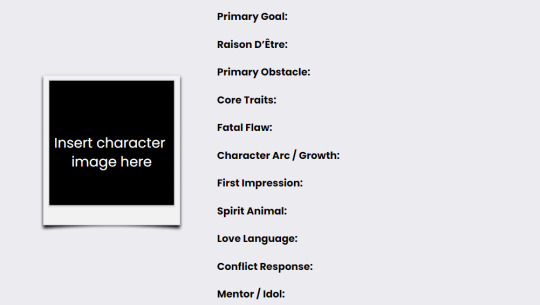
There's some fairly left-of-centre categories here, so in this blog post I'll be creating a character from scratch to demonstrate what each section means and how to use the template effectively.
Primary Goal & Raison D'Être
Fantasy Romance is having a bit of a tournament-to-the-death moment right now, with Hunger Games-inspired stories like Fourth Wing, Throne of Glass, The Savior's Champion, and The Serpent and the Wings of Night in high demand - so that's what we're going to work with in today's blog post.
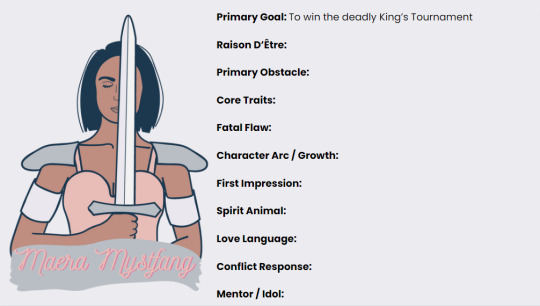
The story premise and primary goal of the protagonist are almost always interconnected. In this case, the story premise is a tournament to the death - and the character's main goal is to win that tournament, obviously.
But where there's room for some originality is in the raison d'être. This loosely translates to "reason for being" or "purpose". It's the why of it.
For example: what motivated this character to risk their life by entering such a tournament in the first place?
It is sometimes helpful to look at similar stories when thinking about this category. Not so you can copy their protagonist's motivations - but so you can do something different.
The whole selfless-self-sacrifice thing, for example - that's done. At least in relation to this particular sub-genre. We can do better for our hypothetical Maera Mystfang character.
Actually, let's really turn the trope on its head and make her raison d'être incredibly self-centred.

Already, this is character is shaping up to be something a little bit different within the niche of tournaments to the death. Which goes to show how putting a little bit of thought can go a long way, even with something as simple as identifying your character's initial purpose.
Primary Obstacle
Every protagonist needs a goal - and every goal needs an obstacle. This is what gives the story some tension and keeps readers turning the page.
An obvious choice of obstacle for this hypothetical character, since we're dealing with a fantasy romance, would be that Maera starts to develop feelings for one of her fellow competitors.
This concept has definitely been done, but that's okay. Not every section of this list has to break the mould. Tropes exist for a reason and it is totally okay to lean into them sometimes.
However, just for funsies, I'm going to try and put a slightly different spin on this one too.
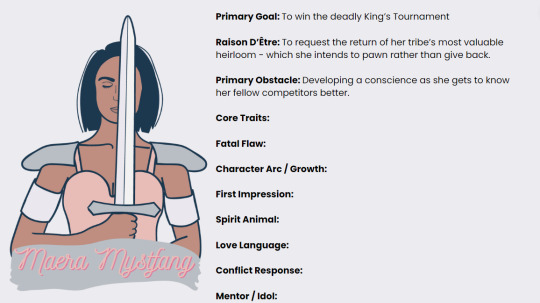
Instead of the obvious "I love one of the people I'm meant to kill", let's make Maera's (previously dormant) conscience be the problem. Her reasons for entering the tournament may have been self-motivated, but as she gets to know her fellow competitors - admires some of them, even - she starts to second guess those reasons.
Core Traits
A lot of character templates will divide personality traits into positives and negatives - but I don't think this is particularly helpful. It is far too one dimensional - not to mention unrealistic. The key components of someone's personality aren't usually so black and white.
In fact, most core traits are both good and bad at the same time - it just depends on the context.
Instead of being wholly positive or negative, try to think of three core character traits that can serve as two sides of the same coin, with both positive and negative implications to each.

For Maera, I've given her these core traits:
Self-reliant;
Rebellious; and
Good-humoured.
Her self-reliance means that she is incredibly capable - but it's also the cause of her selfishness. She's always had to look after herself, so she expects others to do the same.
Her rebellious attitude means she isn't willing to accept the status quo. But at times she is also a rebel without a cause, causing trouble just for the fun of it.
Her good sense of humour means she is fun to be around, but she also tends to not take things as seriously as she should.
Thinking of core traits in this multi-faceted way not only adds realistic complexity, but it also sets you up well for showcasing character development and growth throughout the story.
Fatal Flaw & Character Arc / Growth
You've probably read negative reviews that throw around terms like "Mary Sue" or "Gary Stu". People tend to be over-zealous with these terms, especially for Mary Sue, but the gist of it is that the character in question is "too perfect".
They're the chosen one, they're good at everything, all the boys like them, etc.
Some characters can get away with this just fine. Look at Aragorn. He's the ultimate Gary Stu but I still swoon every time he opens those damn doors. You know the scene I'm talking about.
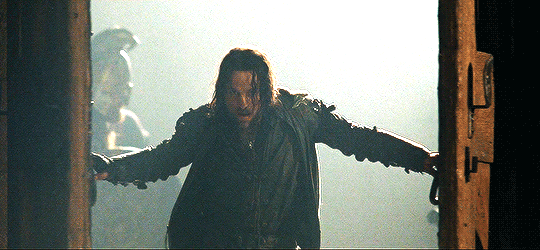
Ooft.
But for the most part, you want to incorporate a fatal flaw into your protagonists - because this is what gives them room to grow.
And, no. "I was born to be King but I don't wanna" does not count as a fatal flaw.
Instead, think bigger. Think worse. Think about where your character starts versus where you want them to end up. Think about how you want the events of the narrative to change their world view - or even their initial goal.
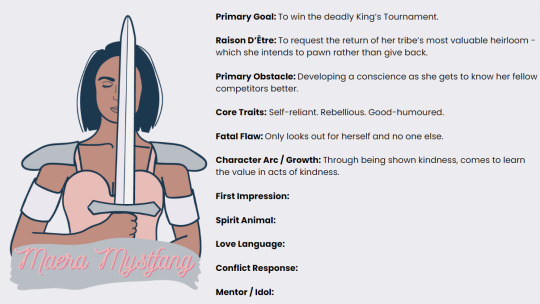
For Maera, her fatal flaw is pretty obvious, given her initial motivations for entering the tournament. Similarly, her growth/arc is linked to her primary obstacle, which is developing a conscious.
Her journey throughout this hypothetical story might be learning to appreciate how her past shaped her, while also acknowledging that there are things she can do to ensure others don't have to go through what she did. By being shown acts of kindness, she learns to appreciate their value.
First Impression
Now that we've covered all the "big picture" stuff, let's get into some of the smaller details that give your character some texture.
The first impression category is a hypothetical exercise where you image how your character might appear to a room full of strangers. In dual, multi, or omniscient POVs, you might even get the opportunity to include this impression somewhere in the story.
But even for first-person narratives, it is still worth thinking about, because it will help to inform how other characters interact and respond to your protagonist (at least at first).
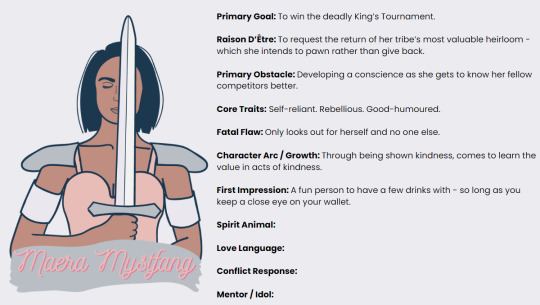
For Maera, I've written this first impression as: a fun person to have a few drinks with - so long as you keep a close eye on your wallet.
From this description, we can guess that Maera probably likes to have a good time, but also comes across as untrustworthy. Whether that impression is deserved or not is up to you, as the author, to decide.
There's also a lot of deeper directions you can take this first impression category, too. Like if most people react to Maera this way, but one particular character doesn't, then your readers are going to sit up and pay extra attention during that interaction. Especially when that person reacting atypically is the future love interest.
Spirit Animal
Ah, this one is a fun one!
I always encourage my authors to assign a "spirit animal" to their characters - especially when they're doing multi-POV.
There are two main reasons for this:
It will allow you to assign some very distinct adjectives and verbs with that particular character; and
It is an opportunity to flesh out some additional character traits beyond the core traits.
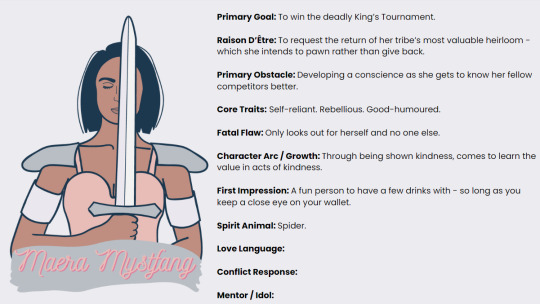
For Maera, I've chosen "spider" because she is solitary by nature, opportunistic, and patient.
But, more than that, I also like the idea of Maera being the kind of person who knows how to watch and wait. While her first impression might be "here for the good times", her joking façade is actually a mask she wears while carefully observing others.
For example:
Her words were laced with venom. She crawled her way across the rooftop. At some point, weaving lies had become more of a past time that a necessity. Her thoughts were a tangled mess. She didn't bother to conceal her predatory gaze. Inch by cautious inch, she crept forward. Her sanity was already hanging by a thread. If there was one thing she knew how to do, it was spin a good story - truth be damned.
I've never outright compared Maera to a spider in these examples, nor have I made it blatantly obvious that that's what I'm doing. But by peppering these kinds or words throughout the story, I'll be able to subtly create a very distinct kind of impression for her character.
For comparison's sake, let's assign "cat" to the love interest. Examples of possible words to consider in this instance might be:
He clawed his way through the bushes. "What are you doing?" he hissed. The comment had some bite to it, that was for sure. He slunk away into the darkness. His still, unwavering focus was unnerving. He prowled towards her. In a few quick, agile steps, he'd made it across the parapet. He yawned and stretched out beside her.
Of course, not every single word you use in association with a character needs to be related to their spirit animal. But keeping a certain type of animal in mind - and finding opportunities to throw in some subtle messaging through language choice - can be beneficial on so many levels.
It helps to distinguish your characters from one another through the kind of language you use to describe them - but it's also just really, really fun way to add some bonus texture to your characters. Giving your readers some little easter eggs like this is never a bad thing.
Love Language
If you're unfamiliar with the concept of the five basic love languages, then here's a quick visual overview:
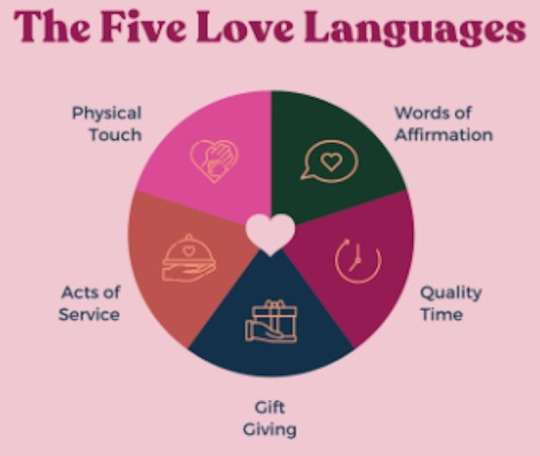
Love languages aren't a consideration that's specific to romance. They're important for friendships and familial relationships too.
Because thinking about what your protagonist values most in love is going to tell you a lot about who they are. Especially when you take the question deeper and think about why this is something they value.

For Maera, I've chosen "Acts of Service" because this ties in quite well to her character arc.
In terms of Maera's why, I could easily go with "because this was how she was shown love as a child" - and this is a good enough option most of the time. However, since her love language is very much tied into growing out of her fatal flaw, then I actually want to do the opposite.
Maera winds up valuing acts of service because this is something she craved - and wasn't given - as a child. She had to do things the hard way instead. Hence why she ends up appreciating the kindness of others so much. Such generosity is new to her - and precious.
Conflict Response
This is potentially one of the most overlooked character components. Conflict and tension is central to story telling, yet there is so little attention given to creating authentic, original responses to conflict.
The way I see it, there are three main considerations in regards to conflict response:
How your character reacts in the moment;
The unhealthy methods they use to deal with the aftermath; and
The healthy methods they use (or discover) to self-sooth.
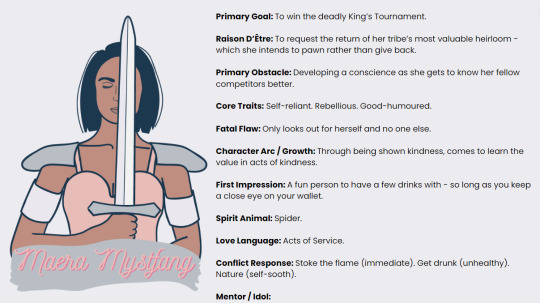
When faced with conflict, Maera's immediate reaction is to antagonise. She doesn't like to back down and enjoys creating trouble.
However, in the aftermath, the conflict affects her more than she lets on. She stews on it - and her solution to that is to get drunk until she can forget about it completely.
But even though she sometimes forgets it, Maera has a more healthy coping mechanism at her disposal. When she is surrounded by nature - in the forest, by the sea, whatever - it calms her.
In addition to identifying your protagonist's various responses to conflict, it is also helpful to think about why. Again, this is a great opportunity to insert something unique into their character backstory.
With Maera, for example, let's think about why she finds nature so soothing. Perhaps, amidst a very bleak childhood, one of her fondest memories is of picking grapes in a vineyard.
Perhaps the elderly woman who owned the vineyard was very rude and abrupt - but also quite kind to Maera in her own way. Maybe she would sometimes stitch up Maera's clothes or feed Maera a hearty, meaty dinner - even though she didn't have to.
If you're struggling to think of a real, tangible, unique memory such as this - then it's always helpful to go back to the old classic of write what you know. Think of a real life moment or memory - something that's stuck with you, no matter how simple - then adapt it to your character.
To create this vineyard example, I simply drew on my experience of picking strawberries with my Nonna after school.
Mentor / Idol
I could write an entire thesis on mentors. Or, more specifically, the "death of the mentor" trope - both in its literal and metaphorical interpretations.
But, for the sake of brevity, let's save that sh*t for another time and focus on what's important for a basic (yet complex) character template. And that is:
The Formative Mentor (past); and
Transformative Mentor (present).
The formative mentor (or idol) is someone who influenced your character prior to the events of the novel. Sometimes they're a character the reader will meet, or other times, they're long gone before the novel even begins.
The transformative mentor is a much looser term. It doesn't necessarily have to be a traditional mentor character, but rather it is a character who heavily influences or changes your protagonist throughout the events of the novel.

For Maera, I want her earliest idol to be a random female sell-sword who she crossed paths with. Prior to meeting this sell-sword, Maera was living without hope for a future, surviving on scraps and petty crime.
But after seeing an independent and moderately wealthy sell-sword in her local tavern, Maera got a glimpse into the kind of life that might be possible if she learned to fight. With the right kind of skills, she might be able to earn some decent money for a change - and travel the world.
This is an example of how "mentors" don't always have to be a wise wizard who oversees your protagonist's training and education. Young minds are impressionable - and even distant figures can have a lasting impact.
Just look at all the women who cite Legally Blonde as the reason why they were drawn to law. Elle Woods wasn't even real - but for plenty of young girls, she made an impact.
Similarly, your protagonist's "present" mentor or idol doesn't necessarily have to be a wise wizard either. It can simply be someone who motivates them to change their world view or strive to be better.
In romance, it is more than acceptable to have the present mentor coincide with the love interest - especially in standalone enemies-to-lovers. I know this seems counter-intuitive, since the word "mentor" implies a power imbalance, but it makes more sense if you readjust your definition of mentor to be "inspires change".
However, for Maera, I kind of like the idea of pairing her up with a love interest who shares some of her flaws. I vibe with the idea of making him a bit self-interested too, although for different reasons.
So in her example, I've listed the present mentor as a selfless secondary character. The way I would envision this going is Maera and the love interest team up early on - but somewhere along the way a secondary character saves them both. They're both heavily influenced by this character before this character sacrifices themselves. The aftermath of this incident rattles both Maera and her love interest, and serves as the spark for growth.
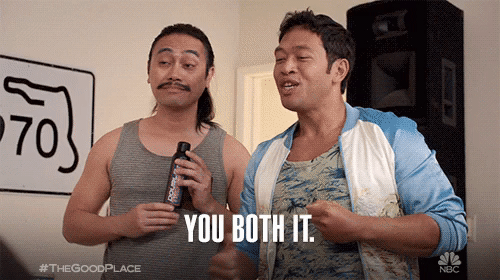
I hope you found this template - and very long explanation - useful!
#writing tips#character tips#book blog#writing#creative writing#character concept#originalcharacter#writeblr#writers on tumblr#writerscommunity#writer community#writer problems#writer things#original character#fantasy character#romance writing#writing advice#writer tips#writer tools#the smut analyst#raison d'etre#character traits#character tropes
206 notes
·
View notes
Text
One thing I really enjoy about the crew of Revenge is the accents.
There is a variety of nationalities that are reflected in the way the characters speak, and it's not something anyone comments on or something that makes someone stand out.
Nothing is uniform; in most shows you have people with more or less the same accents, at best variety of native-English-speaker ones. When a non-native speaker shows up it's always obvious they are slightly different. They're the Russian, the Frenchman, to pick the most commonly used ones. (Latin American characters in English media are their own flavour of Other.)
On OFMD, on the Revenge and most pirate spaces, uniformity does not come across anyone's minds. In a very literal sense, uniform is what we see in the navy. Same clothes, same ethnicity, same accent.
OFMD beautifully portrays what it's like being in an international group of folks where we all come from different countries and use English to communicate. The language becomes a tool without a trace of classism, and accent is just a part of your voice just as it's pitch and tone. When you're the only non-native in a group of English speakers, you can be judged for your accent, in both positive and negative ways. But in a group of non-natives, it's not indicative of your status or intelligence.
And I LOVE seeing Roach, the Swede, Jim, Wee John, Lucius and Stede being on the same level in this. It's giving me something 99% of Hollywood or BBC shows don't - it makes me feel welcome and equal in an English speaking world.
The cultural hegemony of the anglo-american world rarely acknowledges anyone else, and at least from the POV of a European there is a bit of a relatability gap. I spend most of my time with people from different parts of Europe, and most of the time we watch stories about the English or Americans. So it's really enjoyable to finally see something closer to my experience. Not from a POV of a minority in this case but something else, another face of reality.
And for the same reason I also appreciate that in s2e6 La Vie En Rose was sang in French instead of an English translation. Considering the makeup of this crew it was a nice touch to not default to English.
21 notes
·
View notes
Text
Vultur Volans: Alhaitham and the Flying Vulture
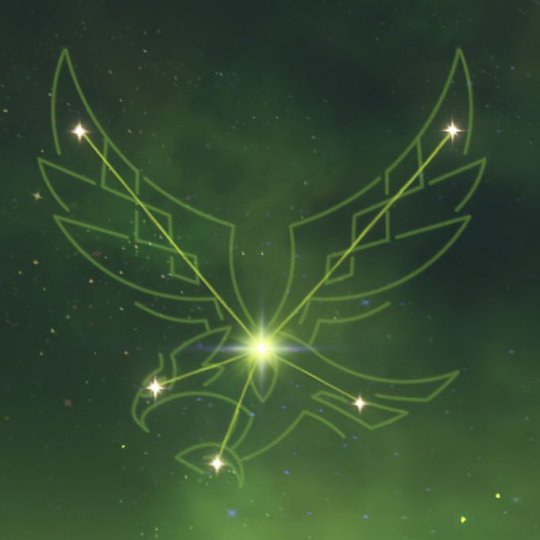
****Possible spoilers ahead!!! (TW: there is one pic of a vulture covered in blood)
Our “feeble scholar”, Alhaitham, is someone who prefers to be away from the eyes of others not because he cares about how others perceive him but because he would prefer to not interact with others (that’s so relatable😭)
Volans means flying/soaring & Vultur is a generic translation for vultures, but not many vultures today have it as part of their scientific name; the reason for this is bc the word vulture is used to refer to a group of raptors that look similar & share a common trait: they feed on carrion
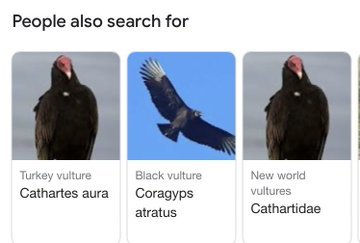
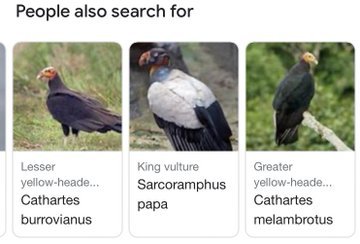
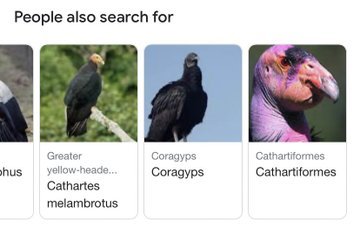
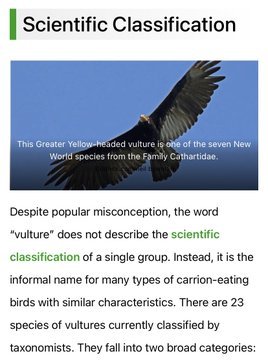
So why is his constellation the vulture, a creature that tends to stand out in the skies or whenever it’s feeding, when he himself is often hard to find?
Normally the first thing we think of when we think of a vulture is “a bird of prey that is an intimidating scavenger,” but there is a lot more to it than just how we perceive it (TW: blood on vulture in 2nd photo)

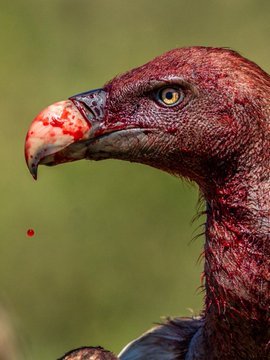
Vultures are intelligent creatures & can be quite wholesome when we look at the way they look after their own family
Like other birds, they will digest food first to regurgitate back into their chicks’ mouths so that their offspring can get the nutrition they need; interestingly, this includes bones which are an important source of calcium (listen, I think they’re wholesome even with this regurgitating behavior, you can’t change my mind 😂)
They are usually social animals that live in groups although few may choose to be solitary
Now that I’ve gotten the wholesome agenda out, let’s look at the symbolism associated with vultures; although they are usually associated with death, there are a LOT of meanings attached to vultures, both positive & negative, so I’m going to focus on the ones that I think can be strongly connected to Alhaitham & his lore: motherhood & intelligence
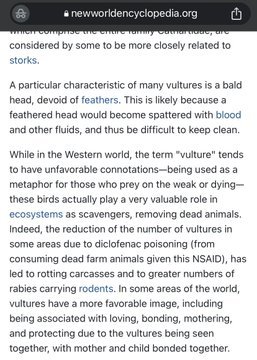
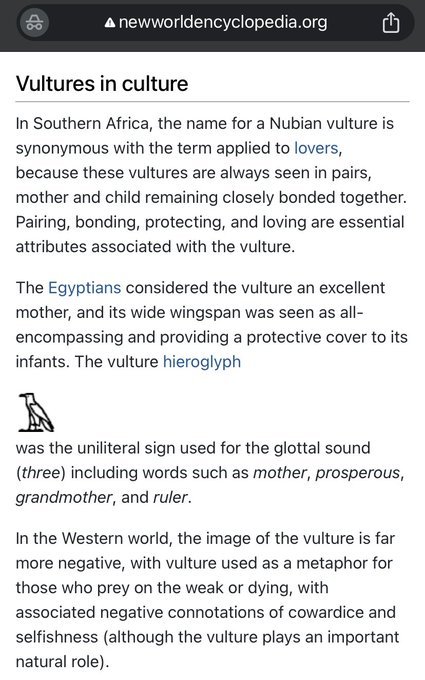
Intelligence is the easiest out of the two to see in his lore, but motherhood is probably the last thing you would think of as a concept present in Alhaitham’s lore at first glance, but I think we should take a closer look at his childhood & how he was raised since it would eventually lead to him becoming the person he is today (motherhood is present essentially in the entirety of his Character Story 5)
He had a grandmother who raised him after the death of his parents. His grandmother had essentially become the mother figure in his life who clearly loved him & understood him. She knew that Alhaitham was incredibly smart even for a child, reading difficult works at the age of seven
She opted to have him start school early, but when he came back telling her that everybody was boring & that he preferred reading books over listening to others lecture, she agreed to let him be self-taught rather than forcing him to attend school
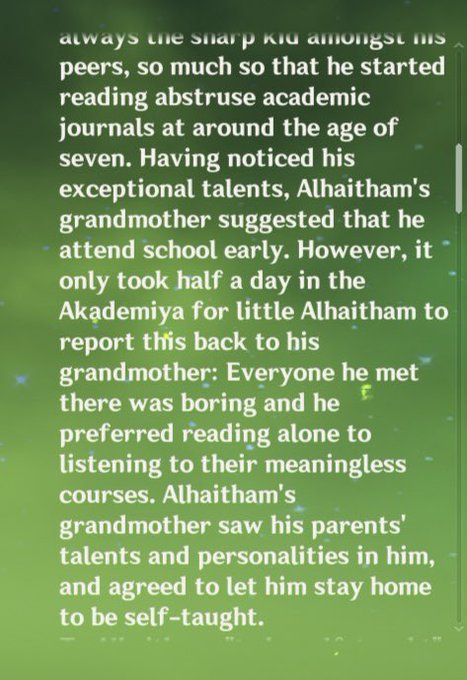
This reminds me of those situations where students sometimes become depressed because they’re not getting the intellectual stimulation needed when they are forced to learn at the same pace as those who are struggling to understand or are new to learning the topics (it might not be the same exact situation but it could speak to him not enjoying his time at school)
Some might wonder “Wouldn’t his self-taught education have negatively affected his social skills since he most likely saw others at the Akademiya boring and thus avoided interacting with them?”
The thing is when it comes to his social skills, there are a number of factors to consider: he knows that everybody has different strengths & weaknesses in various aspects (intelligence, work capability, judgement, etc.) & he knows that he is very different from them, so he already understands that his interactions w/ “ordinary” people are not going to be quite fulfilling; we have to keep in mind that he was VERY young (7 years old) when he was reading about topics that probably many children wouldn’t have understood at that point
I think it goes back to the idea of needing proper intellectual stimulation so that could explain why he called those people “boring” & why he didn’t really vibe with the lectures from that day
We know that he avoids interacting with others, it’s not that he’s incapable, it’s because he doesn’t think such interactions are quite necessary; if it is necessary for him to interact w/ somebody (like in the archon quest w/ the traveler), then yes, he will make an appearance & interact, but otherwise, you’re not going to have much luck w/ him
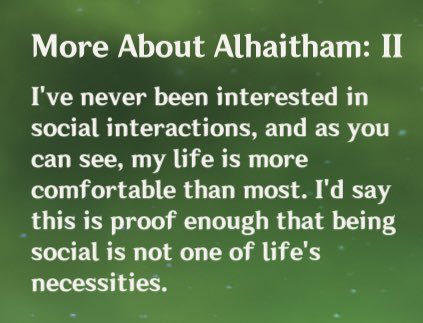
A subtle factor to consider that could further explain his attitude towards socializing with others is the environment of Sumeru itself when the Akasha was still running
Up until the point when the Akasha was shut down by Nahida, many of the citizens took everything that the Akasha ever told them to be factual without ever questioning it, but Alhaitham merely saw it as another source of information that he didn’t completely rely on
For him, it probably felt like being in a nation full of sheep (the mob mentality was probably strong); if he’s interacting with someone who’s just going to regurgitate what a machine tells them, he might as well just be using his own Akasha; chances are he frequently encountered people who simply placed their trust in the Akasha rather than question it
There’s also the fact that knowledge in Sumeru is highly prized & those who show evidence of being geniuses or prodigies are usually shown with much respect (qualifying people based on intelligence is what divides the citizens of Sumeru to the extent of a hierarchy; it’s the reason why there is an obvious divide mainly between scholars & the desert people even though the latter for a long time didn’t have access/had limited access to resources that scholars had within the city so it’s an unfair assessment of the desert people to begin with); Alhaitham is someone who doesn’t like extravagance/over-the-top treatment, which we can see in how his position is something that is glorified/hyped up by others
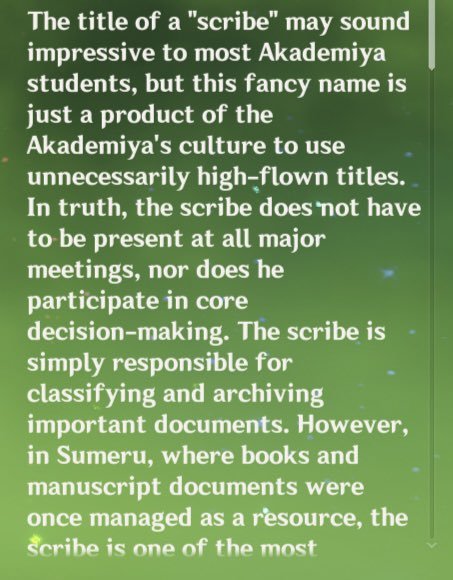
In other words, he doesn’t like people making a big deal out of matters or stalling around when it comes to conversing
Alhaitham’s grandmother taught him to not take his intelligence & uniqueness for granted; bc his intelligence is so high, she believed that it was his responsibility to always stay clear-minded & objective
As a result, Alhaitham doesn’t care about being exalted as a genius or looked down upon as a loner by others in Sumeru; he just looks at everything as it is without overly praising/criticizing something/someone
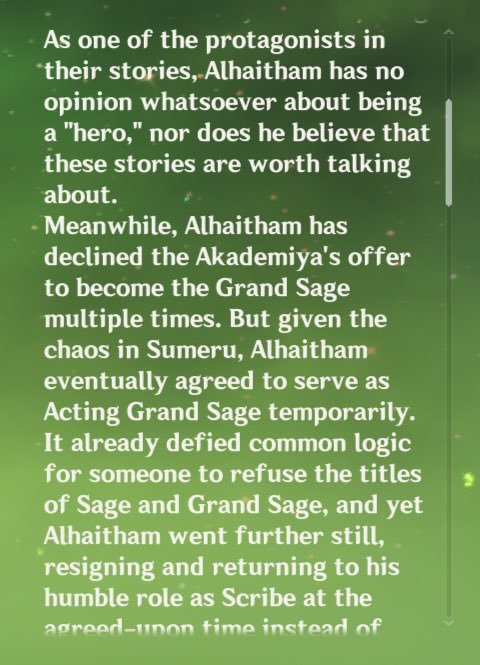
You can tell it’s a trait he values, he’s even smiling as he mentions it being one of his strengths
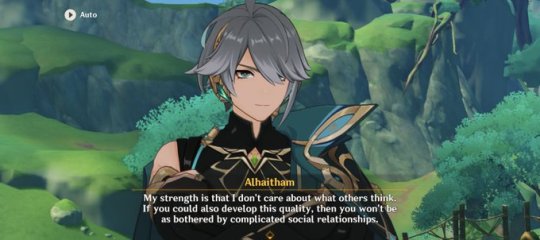
Understandably, there are going to be people who don’t like him after talking to him because their feelings WILL be hurt not only because he’s straightforward with his words but also because not everybody will react well to being exposed/being told they’re wrong/questioned, etc.
Obviously Alhaitham isn’t trying to be mean unless he’s intentionally trying to bait you, then that’s another story, but he will & does acknowledge both a person’s weaknesses & strengths (a lot of people will find his bluntness to be a negative quality, but at least nobody will ever have to worry about him dancing around in a conversation with rhetoric)
In the end, Alhaitham seems to be happy living a life where he doesn’t have to interact with others a lot; his grandmother wanted him to have a peaceful life too so it seems to be a win-win situation for Alhaitham honestly considering that he gets paid well as a scribe & he is living comfortably
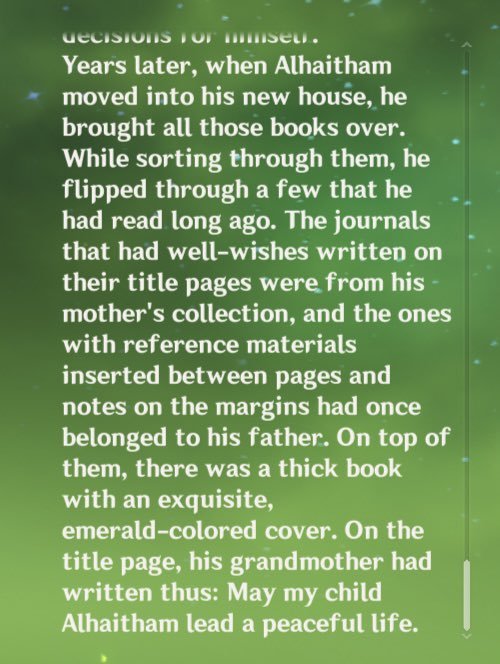
What’s interesting is that society even in our world views being a loner as a negative trait because it implies that you don’t know how to interact with people & there seems to be a requirement(?) to be able to interact with others because that’s just how it is (for any occasion regardless of whether it’s personal or business)
As I’ve said before, it’s not that Alhaitham doesn’t know how to socialize, he chooses not to if he can help it whereas others are just not comfortable doing so
Now the reason why I talked so much about his social skills is because part of it is how he was raised not just in Sumeru but also by his only family, his grandmother who essentially became his mother figure, going back to the concept of motherhood being present in his lore
Based on how he is in the present, I would argue that he was raised well in spite of his bluntness; his grandmother loved him & wanted him to be happy; it sounds like she didn’t force him into anything that he didn’t want to do (like going to school), she taught him to never take his intelligence for granted & to always remain objective; by letting Alhaitham be self-taught, she helped him to nurture his critical thinking skills & his ability to question others
We don’t know exactly if she ever brought up the topic of being blunt to Alhaitham, but if she did, it didn’t really seem like she saw a problem with it, at least not enough for him to change his ways from a young age
It’s interesting seeing such a character and knowing that his family loved him; honestly when we first met him in the archon quest, I wasn’t expecting to hear about him having a grandmother who took care of him; it’s wholesome, maybe not as wholesome as some other things in the game but it’s still a bit wholesome 😊
#genshin impact#genshin spoilers#genshin lore#genshin constellations#genshin alhaitham#tw: blood#there's one pic with blood on a vulture
3 notes
·
View notes
Text
Thank you again for the stills of the wine bottle in this scene. Here are the thoughts I said I'd add in.
Unlike I believe Aziraphale's wine from Chateauneuf-de-Pape from S1 and definitely unlike Crowley's favorite whisky, Talisker, this label doesn't exist. Good Omens made it up, as best as I can tell. There was not and is not a real vintner named Chenevel Rouge, which indicates they wanted to create an original label so they could do what they wanted with it, symbolically, and seems they did...
"Chenevel" is a common alternate spelling/misspelling (demonic and human misspellings!) of the French word "cheneval", which is a derivative of "cheval", which means "male horse/stallion". (Adult female horses have a separate word in French-- "jument".) "Rouge", I think we all know, means "red." Depending on whether or not the "Rouge" is part of the brand name or describing the type of wine or both--and the label makes it seem like it could be either, probably the latter-- the wine, in English, would likely be called Stallion or Red Stallion. A bit like... its drinker in this scene...*fans self like Mrs. Cheng*
Want to say here that we're all aware that Crowley is genderfluid so I'm not saying that correlating him to the wine here when the words for the animal the wine is named after are gendered is trying to say that Crowley isn't genderfluid. It's more that when he's male-presenting while he's human-presenting, this is related to those aspects of him. (Also, I'm using he/him for Crowley in posts because that's what Aziraphale uses and I figure he'd know and care to use whatever Crowley wanted. He was quick to use 'they' for Muriel and he's lovely so... but yeah, should Crowley's pronouns ever be established as different in the story, I'll happily change it.) Back to horses...
Ok, so why horses though? An animal that doesn't seem to have a huge showing here in Good Omens so far? Fair warning that some of the reasons are kind of horny, tbh lol. Not expecting a lot of complaints but yeah lol. The show is using the French-- and so, gendered-- word for 'horse' here in such a way as to make it refer exclusively to male horses is to be nodding to male genitalia. Here is also where I'll throw in that "cheneval"-- the word that is what the label is going for but misspelled by a letter-- translates to "pipe." Ahem. You all seeing what we're saying when we're calling him-- I mean, the wine! the wine-- Red Stallion, right? Ok, good. Less randy symbolism (slightly lol)...
Crowley is already, in part, an animal in Good Omens. He's a snake. It's against his will and a feature of his Fall. Snakes are symbolically perfect for Crowley because they have a combination of extremely positive and negative connotations in different cultures-- they really do represent him well-- but Crowley didn't choose it. There is actually nothing to suggest that Crowley really *likes* being a snake. We've really only seen him as one twice-- back in the Garden of Eden and once, briefly, when he transformed himself into a monstrous mostly-snake-thing to scare the guy in the paintball scene. Interestingly, Aziraphale says "well, you were a snake" when Crowley tells him that he's changed his name in Golotha away from the "skirming at your feet-ish" "Crawley" that wasn't his choice. It's the past tense that interests me there. Yes, Aziraphale is referring to how Crowley was in snake form in Eden most of the time but his use of past tense in the name-change-mention scene, plus Crowley wanting to change his name to get away from being the Serpent of Eden makes me think that Crowley is a snake who isn't really super into it. Like how he chose a new name in "Crowley", at some point along the way, he picked up the idea of affiliating himself with horses.
So now insert here every horse thing you've got, symbolism-wise. Horses are humanity's eternal companions. They're majestic and beautiful and resilient. Wild, untamed, unbreakable. Easily spooked. Known to retain their trauma and not trust easily easily if given reason to doubt. Yeah, this wine named to symbolize its drinker feels pretty accurate in symbolism for Crowley, yeah?
We were supposed to get a Wild West flashback in S2 which *undoubtedly* would have featured horses in some way as it would be literally impossible to do a story about the American West without them, which also means adding in the American-ness of horses in symbolism in things. Crowley often affiliates with cultures built out of rebellion against oppression or that have an anti-monarchist culture-- America, Scotland, etc.. If they decide to put that into S3, we might get more context there but there's still plenty here already. Horses from other parts of the show?
Well, there's that amusing bit in The Globe Theatre scene...
Aziraphale saying he has to go to Edinburgh soon to do a blessing and complaining that, apparently, he'll have to ride a horse. Crowley responding with a grimace and "hard on the buttocks horses are... major design flaw, if you ask me" and indeed, Crowley.
Save a horse and ride a demon, Aziraphale.
Most significantly, there's the horse statue in S2 in the bookshop that Crowley puts his glasses on.


Adding the second gif because you can see the statue up close in that one and... apparently, this is Aziraphale's answer to Crowley's "fighting" angel and demon statue from S1 because, um, well, I can't be the only one who only saw the horse when they were first watching, can I? Crowley leaves his glasses on the animal-free-man-shaped-being "mounting" the stallion statue when he's in the bookshop and the wine is French for male horse ok apparently, I'm a demon and I lied and this is just all horny because *they are, okay?* It's their bloody fault lol.
Right, so, I have no idea when the whole Crowley-is-a-horse thing started between them but it was happening sometime prior to 1938, since that's the other thing you mentioned wanting thoughts on. I attempted to see if this is the same wine they're drinking in The Blitz, Part 2 scenes but the label wasn't clear enough for me to be able to tell. 1938 is probably the best year possible for a wine vintage that is tied symbolically to S2-- especially this part of S2-- because it was the last "normal" year of history before The Nazis invaded Poland in 1939 and WW2 began. This isn't to say it was a peaceful utopia because wars don't just break out one day-- they're built on conflicts that have been on-going for ages until they boil over and the Nazi party was MAGA-ing their way through Germany for ages before WW2 began. But 1938 was the last days of life before the war began. The war in human history-- a large-scale, global, nuclear conflict before it was all over that could have ended the world. The moment when Crowley is drinking this wine in the restaurant is the 1938 of our story in S2-- it's literally while Aziraphale is arranging The Ball that will result in them being separated before the night is over, on the eve of the end of the world with The Second Coming, and they don't know it. Just as no one in 1938 Europe believed they were going to be dodging bombs a hot minute later.
I did a little research on the quality of wine in France that year for kicks because I'm not a wine expert, nor am I rich enough to afford a 1938 bottle of anything. It turns out that it was a pretty terrible year for wine in France and across most of Europe. This is interesting because Crowley and Aziraphale have been drinking wine since wine was invented and if Crowley was looking to order a bottle purely for taste alone, he'd just tell Justine to give him something drinkable and maybe a little of what he likes in a wine and let her pick something out. (I'm not even sure that he didn't miracle the wine. Marguerite's carrying a 1938 vintage is a maybe.) Ordering/miracling a bottle of 1938 wine and then getting Aziraphale's attention and asking him if he wants a glass... it all says the *symbolism* of the wine was what Crowley was going for. He didn't just order wine, he ordered *this* wine, specifically. Or miracled it up or whatever. Mah point is that he was making a gesture with wine.
He realized from what Nina had said to him that Aziraphale acts in love with him to her-- so, to the humans. Aziraphale being in love with him is not news to Crowley. They've known since 1941. In some ways, they've always known but they found a way of expressing it as directly as they're capable during The Blitz and had a talk about not pursuing it beyond what they already had in 1967. After S1, they had gained a little room to breathe but the threats of Armageddon 2.0 and Heaven and Hell were still out there. They were pretending less but still not really being able to be as open with one another as they'd like to be. Nina's observation prompts Crowley to recontextualize Aziraphale's actions of late and look at them from her perspective and he starts to wonder if maybe Aziraphale might be trying to say he wants more. They don't know how to talk in anything but their own little language so Crowley approaches him in that language.
The French restaurant. Aziraphale loves the French. Language of love. Paris, 1793. Sits there amongst the ivy and the roses and the twinkle lights and all the romance of the place-- has moved from sulking in loving long-suffering earlier on the bench alone while Aziraphale did his thing to getting a table. Whistles coolly to get his attention and draw him over and asks him if he wants a glass. Very suave-- he's all proud of himself. The bottle's right there. It gives very come sit with me in the date restaurant, angel, and drink with me the Red Stallion French wine circa the last peaceful year of the era when we first found a way to show each other this wasn't just friends or just sex but that we'd fallen pretty humanly in love with one another.
It's not getting a drink. It's a date.
The miscommunication, of course. S2 is full of them, though this isn't an entire washout, communication-wise. Aziraphale says he's at work and he has a meeting to prepare for. Crowley drinks some more in disappointment. The irony being that Aziraphale is preparing for a meeting that is really a ball because he wants to make a romantic gesture of his own. Crowley doesn't know that yet, though, and it all goes much worse than this moment in the restaurant does. They get to dance-- and that's no small thing for them-- but the demons crashing the party kind of ruined Aziraphale's whole fantasy of a romantic evening.
Before all that, though, he sits with Crowley for a moment, despite his tasks, likely because something clicked in his mind enough that he saw Crowley disappointed, the romance of the place, the wine, and whether or not he truly got that Crowley was like please sit down, angel, and we'll see if we get to just have a nice afternoon date or if it also evolves into asking you to marry me as honestly it's fifty-fifty which one at this point... or whether he was just like oh, look at my beautiful demon and the picture he makes-- c'est une image romantique, magnifique... Aziraphale sits down and Crowley's like so actually I haven't slept all night because I was worried Gabriel's going to pop up outta Jim and murder us so okay maybe this won't be the proposal we'll see if we can do that another time... every damn time we try the romance and not just the hanging out and shagging we wind up having to deal with threats of death, angel, it's *stressful*...
And yet, still, he's trying his best to flirt while talking about the stress of it. He absolutely knows how to past tense the word 'smite' and is just using it because they've spent their afternoon flirting using language. Aziraphale's plume of his imaginary tante is what they were talking about when Nina observed Aziraphale in love and, in a way, Crowley's just wanting to trigger more of it so he goes full Good Omens and goes on about a word that has multiple meanings. Gabriel could smite him-- to attack him, to cause him bodily harm-- and that's the same word as smitten, which means strong attraction and is what he feels for Aziraphale. (The French in the scene that triggers this one involved use of the French "plume", which also has multiple meanings. Crowley translates it as meaning "pen" but it also means "feather" and there is a third, related meaning in Good Omens-- it's what the angels called the pink energy cloud of power that set off the alarm bells in Heaven.)
Even Crowley saying he doesn't know the *past* tense of it is another nod to their long history and The Blitz and romance and he sets it up so that Aziraphale will have to say "smitten" to answer him and he lets Aziraphale see it all coming from a mile away and look at him with exasperated fondness, all yes, Crowley, I see you trying to romance me, very nice, you are doing a lovely job but now you're tipsy atop your anxiety and why don't you go to the bookshop and have a nice nap under a nice sunny window while I go finish arranging my own romantic attempt for, um, Maggie and Nina, of course...



Yes, I love you, dear. Smitten. Madly. Now please go to the bookshop safe space I made for you and talk it out with our former-attempted-murderer-turned-new-best-friend and then take a nap because I'm going to need you at full horsepower for dancing and other things later...
The wine that Crowley drinks after the "I know what you are" convo with Nina is a 1938 Chenevel Rouge.
Chenevel Rouge.... if you rearrange the letters you can spell these words: urgence he love.
Urgence is an archaic form of urgency.
Is this something is this a ✨️Clue✨️ or am I losing it send crepes send help.
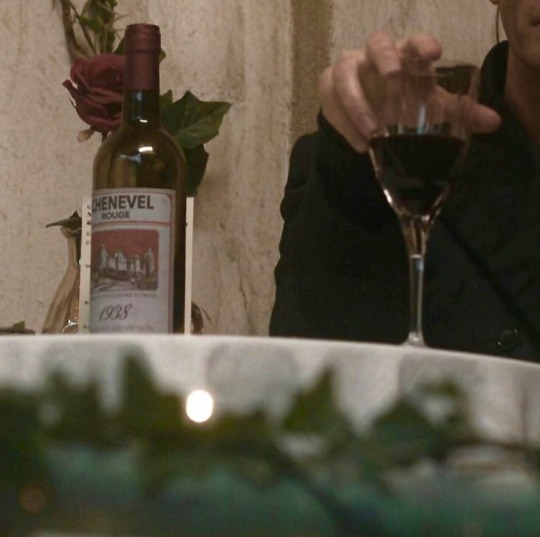
(Chenevel Rouge also sounds slightly like evil red dog in French.)
#ineffable husbands#good omens#good omens meta#good omens analysis#good omens 2#crowley#aziraphale#crowley x aziraphale#aziraphale x crowley
724 notes
·
View notes
Text
Beneath Our Scars - chapter 1 review

This is a brief review of Beneath Our Scars (BoS), ChiNoMiko’s new game. Full disclosure: I translated the game from French to English (and then someone else did some editing since English is not my first language), and I also alpha and beta tested, so I’ve been aware of the contents of this first chapter for a while now. However, this doesn’t affect my opinion since I’ve found this game really cute from the first moment. So, here we go.
What is the game about?
The story follows Melinda and Rowan, two teenagers (she’s almost 18 and he’s 19), who reside in a private clinic because of their ongoing medical conditions. Meli and Rowan know each other a little because they have been chatting on the same platform, and one day Meli realises that Rowan might just have moved in her same clinic. We spend this first episode traying to find him, and then having a first meeting with him.

As only one chapter is out, I don’t know how the story is going to evolve, however we have a rating so we know at least the theme of the game. Which brings me to the second point of this review.
Info and technical aspect
The main thing you have to know is that the game is FREE. Completely, 100%, free. It is something that Chino and her boyfriend are doing as a hobby in their free time, she wanted to go back to drawing more constantly and work on a story on her own, and he wanted to expand his coding knowledge. This project has nothing to do with Beemoov and their jobs, so they are not making money out of it. For this reason, the game at the moment is only available in French and English, as they don’t have the capacity of translating it in other languages right now.
You can play the game on app (both ios and android) or pc at beneathourscarsDOTcom. As you can see from the screenshots the view is vertical so it fits on mobile screens, but it works just fine on pc as well.

The gameplay is the usual: there are choices, some good, some bad, the good ones increase the game overall LoM. On the negative side, we don’t see the LoM so we don’t know if the choice we just made is positive or not, but on the plus side we get a final score at the end of the episode or if we miss the illu, so with a few replays we can easily figure out which are all the best choices. In this chapter we have two illustrations, the first unlocks automatically, the second requires 6/10 score, i.e. 10 choices in total, each can give 1 point, we need a minimum of 6 good ones to get the second illu.

You can also have fun replaying as much as you want to unlock all choices or get the perfect 10/10 score, since the game is free, and we also have the HOLY skip button which allows us to skip all previously-seen text.
The rating is the following:

The main focus of the story is the romance, this is very much a game about two people getting to know each other and falling in love. There will be a bit of spice eventually, but nothing explicit. Personally, the first time I heard about the game, I wasn’t sure if I were going to play, because I tend to avoid anything too sad, for example I never watch hospital and medical based tv shows. So I was really reluctant. But I’m glad I gave it a go because the atmosphere is not heavy at all, there is going to be some talk about illnesses etc, and some sad events may happen in relation to secondary characters, but the story is very much about rebirth and moving forward, neither Meli nor Rowan are going to die and nothing critical is going to happen to them. There is going to be SOME drama in the future, because this game is still done by Chino who, at the end of the day, we all know is a bit of a sadist, but it’s not going to be too heavy and won’t hinder Meli and Rowan’s journey.
The characters
Finally, this brings me to the main reason why I like the game: the characters. Honestly, the main reason I stuck around Beemoov all these years is that I got attached to the characters and managed to fall in love with most LIs. I really think that Chino’s strength is in the characterisation and this game is not an exception. The chapter is short, but we can already see Meli and Ro’s personalities shine through. She is a positive and bubbly person, who had to go through terrible times and tries to look for the positive side of things. Rowan is an introvert, calmer and thoughtful, he’s also newer to his condition compared to Meli, so I can see her helping him out a lot during his journey.
Rowan and Meli be like:

Also... how beautiful is he??

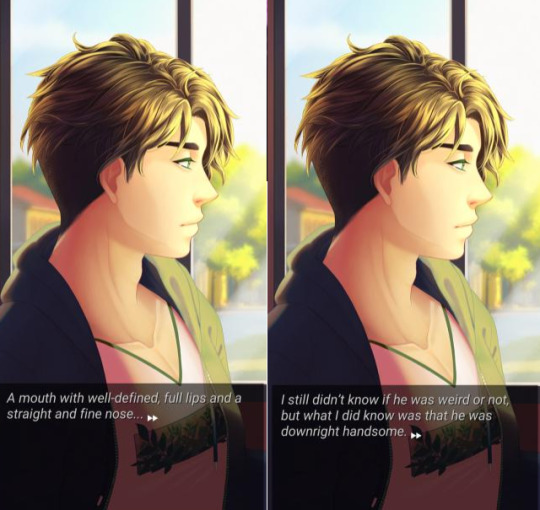
p.s. I suggest you pick the book choice at some point because Meli picks the wrong book by accident (guess which one!) and the scene is loool 😄🔥
I look forward to chapter 2! ✨
121 notes
·
View notes
Text
Despite my busy schedule of reading fanfic, writing fanfic, and thinking about what I should do next in the fanfic, I managed to finish reading a book! A Lady's Guide to Celestial Mechanics, by Olivia Waite. I think my final verdict is "it's okay, but it could have been a lot better." (Crossposting from my DW, if this looks familiar to anyone.)
Basic synopsis: Lucy Muchelney has been working as her astronomer father's scientific assistant and in fact doing much of the work. She meets Catherine, Countess of Moth, who is a new widow and former victim of spousal emotional abuse, and tries to make it as a scientist in her own name with her new patroness. The official, misogynistic scientific society is against her, but her pop-published translation of an important French work takes off, leading them to try to embarrass her in a debate with the original author - only to inadvertently champion the cause of minorities in science. A happy ending!
To start with: it's well-written. Like, the text is never clunky, the prose is very nice. That's more than I can say for a LOT of romance novels. It's lacking all the romance-novel clichés that I hate!
But ... that's also a negative. The romance novel clichés, it turns out, are extremely boring to me when they're het - I'm always like, "why can't the man and the woman actually get along when they're not kissing/having sex? why can't they support each other? why can't things happen that aren't directly related to the deep erotic blaze they feel?" when I make the mistake of picking up a straight romance novel, and Lady's Guide does a great job of saying, "they can!" Unfortunately, this means that there is no tension or conflict between the characters until close to the very end, and it only lasts about a chapter. It turns out that I am actually super into those clichés as long as it's with a queer romance! As my AO3 output will show, frankly.
But yeah, the characters are kind of doe-eyed and supportive of each other and the story barely has anything to do with their romance, which is a cardinal sin in Romancelandia. They meet, Lucy comes to live with Catherine, they both dart glances at each other like "is she ... ?" and then they give in and kiss, and then they have sex. The obstacle comes in when they meet Lucy's ex, Pris, who got married to a man at the beginning of the book - cribbing a bit from Anne Lister, it's a Marianna situation except that Lucy finds it pretty easy to resist her - and Catherine is jealous and they don't communicate briefly, confusing them into thinking the other is done with the relationship before they explain and come back together. More grievously still for me, they just seem very samey. Their personalities seem pretty similar and if they had different aesthetics I didn't pick up on it or forgot.
Which brings me to my next point: it might just be that I knew the third book in the series was about working-class suffragists (which is extremely Social Justice Approved), but I felt like so much of this characterization and plot was determined on the basis of "what would make this book Feminist and LGBTQ+ Positive?" Lucy is introduced with her dickish painter brother threatening to sell her telescope, and the men of the scientific society are all wankers who condescend to women, promoting a well-connected (white) male idiot to do the official translation over Lucy and a biracial man. Pretty much every female character has some kind of passion or talent that is being stifled by society, which they turn into something lucrative by the end, and Waite is careful to not focus just on STEM but to have characters announce that Embroidery Is Art, Too and so on. One of the reasons that Catherine and Lucy seem so samey is that they are carefully constructed to walk a middle path between butch and femme, closer to the femme side, which avoids the cliché of historical women hating gowns and corsets etc.
And I hear you saying, but Cassidy! It sounds like she did everything you complain about authors not doing! This is true. However, it felt like it was done specifically to make discourse-savvy readers happy rather than because it was true to characters that appeared in her head. (Also, I freaking love a strong butch/femme dynamic, I am high femme and I swoon at the thought of a tall, chivalrous butch, particularly if she sometimes dresses in historical male clothing. GOD. In general I like "opposites attract" ships, really.)
This all being said, I loved the twist of the French author turning out to be a titled woman of color - it was really well handled. I didn't think at all about their identity, just assumed they were a Macguffin, and so the reveal blindsided me. Very little in romance novels is actually surprising, so that was great. But on the whole, I didn't feel the feelings I ought to have felt in reading. And maybe my standards have been off because I've been reading OFMD fic that really makes me feel things lately, but IDK.
17 notes
·
View notes
Text

[Image Description: an Undertale textbox with “FANCONTENT PREFERENCES” in all caps in its middle. To its left and right are a radar screen and a line graph from the Dating Hub. End I.D.]
This section is focused on the different mediums in which fans consume and create fancontent. We used a Likert 1-5 scale to ask people about the frequency in which they consume or encounter different kinds of content, in which 1 translates to “Never” and 5 to “Always/high frequency”. The number shown in the graph represents the average of people's responses, which could range between 1 and 5.

[Image Description: a barplot titled “Types of Fancontent Consumed”. From left (greatest) to right (least): Average Frequency of Consumption (on a scale of 1-5) for fanart is 4.33; average for comics is 3.58; average for fanfiction is 3.37; for remixes, 3.3; for original UT music, 3.25; for meta/theories, 3.17; for animations, 3.12; for Let’s Plays, 2.43; for Comic Dubs, 2.39; for Cosplays, 2.19; and for AMVs, 2.13. End I.D.]
The most consumed type of content is Fanart, by far, with a score of 4.33. Whether it is digital or traditional drawings, elaborate pieces or sketches, they are the most viewed. Comics, another visual medium, are in second place with a score of 3.58, almost a full point behind fanart. On the other hand, AMVs and Cosplays had the lowest scores. This could be due to the tools needed both in crafting or editing, leading to less creators for these kinds of contents. We currently do not have enough information to draw further conclusions.
[More analysis, including fancontent created, genre preferences, and NSFW interaction statistics are under the cut. No material presented is NSFW in nature.]

[Image Description: a barplot titled “Types of Fancontent Created”. From left (greatest) to right (least): 1586 responders make fanart; 997 write fanfiction; 501 create comics; 285 write meta/theories; 238 do cosplay; 178 create animations; 81 do dubs/voice acting; 69 do AMVs; 61 do remixes; 53 make original UT music; 79 do other things; and 715 do none of these. End I.D.]
1699 people stated that they create UT fancontent, representing 64% of the sample. When asked about the types of content they made in terms of medium, allowing people to pick multiple options. The most common was fanart with 1586 votes (93.3% of all creators). It is notable that visual and written mediums (such as Fanart, fanfiction, Comics and Meta/Analyses were the most common among fans. We believe it is related to the accessibility of these mediums, since they do not always require specialized programs or tools. On the other hand, the least common types of creators seem to be for auditory mediums, such as original music, remixes, AMVs and voice acting. This could be due to the tools needed in order to record, edit and compose these kinds of content. However, further research is needed to understand the reasons behind this distribution, so these hypotheses stay unanswered.
About 3% of fans said they create a different type of fancontent than those listed here. Common “other” responses included personal AUs, roleplays, askblogs, and memes.

[Image Description: a barplot titled “Genre Preferences in Fancontent”. From left (greatest) to right (least): 2204 responders CONSUME Fluff content and 1354 responders CREATE Fluff content; 2014 consume and 1184 create friendship/family; 1950 consume and 972 create humor; 1779 consume and 966 create hurt/comfort; 1619 consume and 993 create angst; 1619 consume and 790 create romance; 1355 consume and 602 create adventure; 1061 consume and 456 create drama content; 1033 consume and 477 create crack/parody; 933 consume and 372 create horror; and 50 consume and 800 create no content. End I.D.]
Genres of fan content were mostly taken from Fanfiction.net’s genre options, as they seemed to encapsulate the most common broad categories. “Fluff” was added and defined as “content centered around positive feelings,” not necessarily romantic content. “Angst” was defined as “content centered around negative feelings.” Romance was omitted as a genre by accident. Participants were allowed to select as many genres as they liked.
Trends in genre tended to be the same across content both created and consumed. Fluff was the highest ranked genre, followed by Friendship/Family and Humor. The game itself focuses on the themes of friendship and holding onto hope, and the characters are well known for their humor. Considering this, the genre rankings make sense.
Horror was the lowest ranked genre in both categories, with 35.2% consuming and 14.0% creating it. (This should not be confused with Horrortale the AU, which as we will see in a later post, is consumed by 43.7% of all responders.)
1.9% of fans (50 responders) selected the option “I do not consume fancontent.” While it may seem odd that they took this survey in that case, it may be that they consumed content in the past and still consider themselves part of the fandom, even if they no longer interact with fancontent.

[Image Description: a barplot titled “NSFW Fancontent”. From left to write, most interaction with NSFW fancontent to least: 74 primarily consume NSFW content and 35 primarily create it; 472 often consume it and 86 often create it; 594 rarely consume it and 262 rarely create it; 37 do not consume it but may in the future and 314 do not create it but may in the future; 494 do not intend to consume NSFW content and 988 do not plan to create it. 52 preferred not to answer about consuming it and 38 prefered not to answer about creating it. End ID.]
1723 people (65%) who took the survey are over the age of 18, and they were shown an exclusive section asking about Not Safe For Work content. NSFW was not defined in the survey, but is commonly used to denote content that is overly sexual, violent, or otherwise dark in nature and would not be suitable for children or the workplace.
Contrasting creating and consuming, it is clear that those who do not create content like this are the majority. When subdivided, most of them (57.3% of adult responders) stated they do not intend to create it in the future. Among the people who create NSFW content, the majority (15.2%) do it rarely, and is not their main type of content. In terms of consumption, the biggest group consumes NSFW content, but rarely (34.4%). They may read or look at fanworks that contain mature themes but are either skippable or not the main focus of a story, which may appeal to people who otherwise would not consume NSFW content.
84 notes
·
View notes
Note
Hi! hope you're doing great 🥰 Idk if this question has already been asked and it might sound silly but I struggle with developing my male characters because I genuinely don’t know how men think and act irl… Even though I'm writing a pretty self indulgent series I don't want the male characters to always act like I would want them to and make the story too smooth? There has to be some conflict and angst at some point to make the characters grow. (1/2)

Hi, anon! It doesn't sound silly at all. I think this may actually be two questions though: how to write a gender you're not, and how to create believable conflict/character growth. (this got long, so adding a read more)
It's always a struggle (and one of the most beautiful parts about writing) to put yourself in someone else's shoes and write a story from their pov. Writers are often observers of character in addition to story-tellers. Actually, I'd argue you can't be a good story-teller without a strong understanding of people.
.... that is to say, people are strange and contradictory and flat-out confounding. LOL
Ultimately though, I think it's important not to start from a place of what you don't have in common with your character, but rather what you do. Yes, men and women have differing perspectives based on how the world treats them, what societal expectations are, and physical reactions. Despite this, men and women are also very similar.
All people have a hierarchy of needs. Everyone struggles for a sense of acceptance and belonging. Everyone has strengths and flaws.
Some of my favorite books have male leads (Percy Jackson, Harry Potter, Red Rising, The House in the Cerulean Sea, Under the Whispering Door, The Song of Achilles, etc.) and while reading them, I didn't think, "how strange, this male thought pattern." Instead of imagining your character to be inherently different, think about how their experiences might have shaped them and how this could translate into their words and actions.
If you have specific questions while writing and don't have someone in your life to ask, the internet is always there! There are tons of great resources to educate yourself on gender differences and similarities.
That said, I do think the first part of your ask is a somewhat different topic. How to write characters who are believably flawed, or: walking the line between Irredeemable and Relatable. If you have characters with 0 flaws, readers won't connect and the story will lack tension/believability. If your characters are abusive or so flawed they can't move forward, your reader may grow frustrated and stop.
Honestly, I think this is something best explored with practice. It's a fine line to walk and there's no magic percentage or ratio to mimic. A few pieces of advice I have are:
1. Everyone has faults. There is no perfect person; a character without faults is a fault in itself.
2. Strengths are also weaknesses. What I mean by this is every positive attribute you give a character has an underlying negative. For example: your character is logical. As a negative, they may struggle with empathy. Pro: your character is emphatic. Negative: they may struggle with making decisions. Pro: your character is organized. Negative: they may struggle with being spontaneous. It's when a character is both organized and spontaneous that they may seem unbelievable!
3. Someone messing up doesn't make them irredeemable. I think sometimes writers are afraid to show characters making mistakes because they think people will write the character off. If we wrote someone off each time they messed up though, we wouldn't have any friends or family members to speak of. There's a lot of grey area in mistakes: ask yourself, was the mistake purposeful? Was a character being deliberately antagonistic? Was there an underlying reason the mistake which needs to be processed? Everything above results in shades of grey which make your character more or less forgivable.
4. People are hypocrites. Similar to everyone has faults; no character is going to be 100% consistent all the time. Your character can be constantly laughing and then find themselves in a scenario where they're forced to be serious. Their usual reactions might influence how they respond, but it's plausible for them to do something different. People change and sometimes, flat-out contradict themselves.
5. Consistency is key. THAT SAID lol, there at least needs to be a thread of commonality for your character. If they do make a contradictory decision, how might this affect them later? Or, in what circumstances might they act in a manner outside of their temperament? At what point would your normally shy character stand up for someone else?
Phew, okay. I hope something in the above was helpful to you! Wishing you all the best with your writing, and stay healthy + safe!
20 notes
·
View notes
Text
“…First and foremost, one of the strongest and most fundamental influences on medieval scholarship about women throughout the entire Middle Ages was the bible. Christian writers relied on the bible because of the fact that it represented God’s holy word, and as such offered important and (at least theologically) irrefutable ideas about women, the majority of which cast women in a decidedly negative light.
To be sure, there were (and still are) biblical verses that portrayed women in a more favourable – even militant – light, such as Deborah, a prophetess and leader of Israel who helped guide the Israelite army to victory over the Canaanites, and Jael, who it is written killed the Canaanite general Sisera, but the overall image of women is a negative one. Various passages throughout the bible reiterated how women were supposed to be, for instance, silent in public, submissive to their husbands, periodically unclean to touch, and scheming seducers of men.
Yet it was the Genesis story of creation and the Pauline Epistles which were to exert the most influence upon medieval conceptions of women. Indeed, Paul himself used the Genesis creation story, specifically the idea that women were created of man and that they caused the Fall of Man, to justify man’s superiority over women and show how women cannot be trusted and require male guidance. Similar concerns about women were displayed by the early Church Fathers, whose writings bridged the gap between the biblical and the medieval period and helped formulate much medieval Christian doctrine.
Their thought is indicative of why later medieval conceptions of women were primarily negative. There is, for instance, the uncompromisingly misogynistic view of writers like St Ambrose (c.338- 397) and St Jerome (c.347-420), who contended that ultimately women were the root of all evil and defined them primarily as lustful beings who must strive for the ascetic life in order to be reconciled with God. Only through a life of reflection and controlled living could women achieve salvation, for nothing else would suffice.
A slightly more temperate view is that of St Augustine of Hippo (354-430), whose writings, for various reasons, were highly influential in shaping the attitudes of the western Church in the Middle Ages and beyond. He adopted a more subtle approach to the issue and argued that although God only made man in his image and not women, both sexes resemble God at the level of the soul, a level which occurs whenever anyone from either sex contemplates or spiritually seeks out God through prayer and religious devotion. In that activity gender becomes redundant, and they both resemble God’s likeness.
Nevertheless, despite this spiritual unity of the sexes, women still differ from men physically and can only ever hope to be man’s helper, as noted in Genesis, thus it is only when a woman is together with her husband that she forms the image of God. By identifying women’s inferiority in their bodies therefore, Augustine was free to highlight the inherent sinfulness of the body and hence argue that women were more prone to sin and must be under male control.
Patristic and biblical sources, therefore, were highly influential in shaping High and Late medieval conceptions about women. Yet in order to understand one of the key writers in this area during the high medieval period, Thomas Aquinas, it is necessary to understand the work of Aristotle (384-322 B.C.), whose ideas about the nature of women remained virtually unknown in Europe until the mid-thirteenth century, but which then became an important base for later medieval discussions about women. We shall come to the rediscovery of Aristotle shortly, but first it is necessary to explore the essential elements of his thought.
He was, of course, the student of another great classical philosopher – Plato (c.428-c.347 B.C.), but unlike Plato, who suggested that men and women could to a certain extent participate equally in political life and military matters, Aristotle’s work left no doubt as to the subordinate and inferior role women should play in society. The clearest expression of this inferior status is found in Aristotle’s Politics and his ideas about the natural hierarchy of beings. This book described a natural order of ruler to ruled, where he contended that just as tame animals are by nature better than wild ones and should be ruled by humans if they are to be preserved, so ‘the relation of the male to the female is by nature that of better to worse and ruler to ruled’.
Such a statement leaves little doubt as to the subordinate role women naturally assumed in relation to men. Nevertheless, evidently trying to clarify and further distinguish the nature of this male-female relationship, he states that within the household the male rules over the female ‘for by nature the male is more fitted for leading than the female’. The male’s right to rule ‘by nature’ stems from the fact that, although women have the ability to deliberate and make decisions, they are nevertheless ‘not in control’ of this ability. In other words, women are able to reason, but they are unable to control their passions, unlike men, who can both reason and control their passions, and who therefore should rule over women.
Moreover, nature makes things for only one purpose; for women, their natural role was in bearing children and tending the household, which left the men free to practise politics – a role that accorded with, and was dictated by, nature itself. As a consequence, women must also be excluded from military participation, since, as Aristotle notes, ‘the political way of life...[is one]...divided between the needs of war and peace’. In other words, war was a political – and by implication – male-only affair. Women’s natural procreative purpose and inability to be in full control of their reasoning capacity shut them off from any political rule or military participation.
Important as these ideas would become in later medieval thought, however, they found no traction in medieval political thought until the mid-thirteenth century, when firstly the Nichomachean Ethics and then the Politics were translated into Latin in 1246/7 and c.1260/65 respectively. Their translation formed part of the larger rediscovery of Aristotle’s philosophy in the medieval West at that time and coincided with the flowering of Aristotelian studies in the universities at Paris and Oxford during the 1240s and 1250s.
Amongst the first to engage with this rediscovered material was Thomas Aquinas (c.1225-1274), whose Summa Theologica (written 1265-1274) is notable for the way in which it wove together the patristic writings of the early Church with the emerging naturalistic Aristotelian world view into a text which has been described as ‘at once more androcentric and less misogynist than the patristic inheritance’. More specifically, Aquinas helped synthesise the rediscovered works of Aristotle with more traditional Christian notions regarding the body-soul duality, and in so doing offered a new foundation and justification for male superiority in the physical world.
Adopting the Aristotelian idea of a natural hierarchy, in which those with more rationality ruled those with less, Aquinas applied it to the Christian tradition by placing God at the apex of a divine order of beings, over which He had supreme control. In this divine order man was possessed of a better intellectual capacity than woman, and although both sexes had a rational soul, men’s greater ability to reason made them naturally superior to the female sex, and the logical rulers of society. Women, on the other hand, were a sex created solely for purposes of reproduction and no other, since procreation was the only task which unquestionably required male- female cooperation, and in all other tasks man would be better served by another man in fulfilling that task.
Moreover, although women help ensure the survival of the species, Aquinas maintained that ‘man is yet further ordered to a still nobler vital action, and that is intellectual operation’, as man’s ultimate goal must be in striving for rationality through the perfection of the soul. Thus, in his conception, women serve an inferior bodily-related function, unlike men’s role as leaders and the natural rulers of the world in which they live. Furthermore, while both sexes have a rational soul and are formed in the image of God, men nevertheless have this image in a superior form to that of women.
In essence, therefore, Aquinas used Aristotle’s ideas on natural order to assert that the inferiority and subjugation of women was a natural state of affairs, and in so doing he helped reinforce the biblically based arguments earlier Christian theologians (such as the Fathers) employed to justify the subordinate position of women. Additionally, it is clear that his conception of women’s avowedly domestic social function left no place for women to fight in medieval militia or command troops.
In Aquinas’ view, women’s only true hope for equality with men lay in the resurrected state (after death) where, because both men and women are possessed of a rational soul, both sexes are able to come together in worshipping and loving God in a place where there is no need for any form of carnal expression or coitus. Thus, only once free of all bodily processes and temptations is Aquinas willing to afford women equal standing to that of men. For all his efforts to reconcile Aristotelian philosophy with the bible, however, it was not Aquinas but rather one of his students, Giles of Rome (c.1243-1316), who in fact made Aristotle’s ideas accessible to more than just a university audience.
His lengthy mirror-of-princes work De regimine principum (c.1281) – dedicated to the future French king Philip IV (1268-1314) and intended to help guide him in governance as well as princely conduct – was highly popular and widely translated into numerous languages (even today more than three hundred Latin manuscripts still survive). Indeed, it has been described as ‘the most successful product of the mirrors for princes genre’, probably because it was one of the few such works to bridge the gap between lecture theatre and noble household. This success can be attributed to the way in which Giles distilled the ideas contained in Aquinas’ work and presented them in a very readable and systematic format.
While the specifics of Giles’ arguments as far as they relate to female militancy are presented in the third subsection, for now it is enough to note that it was his work that provided the most publicly accessible expression of Aquinas’ political thought and of women’s supposed inferiority to man. Examining the development of political and theological thought up to its fusion in Aquinas’ work, therefore, there was evidently a generally negative, even hostile, attitude toward women, combined with a broad denial of any possibility that they could be useful for any public leadership role. It is fair to ask then what prejudiced these men, and many others not mentioned here, against women, why they were so unwilling to acknowledge that women could reason, and why they were so quick to denounce their sinfulness.
Although it is possible that individual experiences may have influenced what these authors wrote, the clearest explanation for such attitudes is that women’s roles were classified on the basis of their biological differences from men, and they were held to a different standard because of it. As Susan Okin notes, philosophers and theologians were led to define women ‘by their sexual, procreative and child-rearing functions within [the family]’, thus theoretically constraining the roles which women might perform outside of private life. Moreover, by linking women to temporal and less rational bodily processes, Christian theologians could argue that women were more prone to suffering a loss of control or reason (for instance, during sex), just as the first woman, Eve, was the one tempted and who caused the Fall of Man.
Invariably this line of argument led them to conclude that all women were inferior to men in practically every way and that their only conceivable temporal purpose was as an aid in reproduction. Such sweeping generalisations suggest that there was a subtle, if ill-defined, male fear of ‘female sexuality and reproductive functions’, perhaps because the vast majority of medieval authors were members of an educated but celibate clergy who rarely came into contact with women and were, consequently, quick to point out the supposed faults and weaknesses of women.
Furthermore, we cannot rule out the role patriarchy had in shaping negative views of women in the High to Late Middle Ages. Patriarchy emphasised a certain core set of male-centred values and beliefs that included such qualities as strength, logic, rationality, calmness under pressure, control and toughness – all of which were well suited to the political and military arena. In medieval times (and even today) this meant that more traditionally ‘feminine’ values, such as cooperation, equality, compassion, and emotional awareness, were not emphasised and consequently less valued, especially when it came to war.
As a result, medieval authors espoused a general belief in the universally passive or timid nature of women, as opposed to the ‘active’ nature of all men, which they used to help delineate the differences between the turbulent (but logical and rational) male world and the more tranquil female domestic sphere. Thus, female involvement in public affairs would have challenged or compromised the traditional image of men as the ones who engaged in public activity and who defended those believed to be unable to defend themselves, namely women and children.”
- James Michael Illston, ‘An Entirely Masculine Activity’? Women and War in the High and Late Middle Ages Reconsidered
20 notes
·
View notes
Text
Geno and Anna’s Match TV interview
ABOUT THE RETURN TO RUSSIA AND THE RETURN OF THE NHL
- It's so good in Moscow, our parents have now arrived to babysit their grandson. We get high, we feel good. But, of course, it's hard to be in the dark - we, like everyone else, are waiting for specifics: when, what, why. Because the very preparation for the season gets confused when you do not know what will be ahead. Hopefully things will start to settle down soon.
I would like to return to hockey already. I've already started thinking about age - not much remains until the age of 40. Moreover, when you performed unsuccessfully, there is a desire to go on the ice again and prove that we have a good team.
Do I want to play at the Olympics? I always wanted to, but again - I am for justice. I agree with the coaches that the best should play in the national team. If I am ready and fit the style of the team, I will come with pleasure.
ABOUT THE FUTURE AT PITTSBURGH
- In the new season, the team will be new. Would I like to spend my entire NHL career in one club? Let's not guess, but everything suits me in Pittsburgh. I am not the kind of person who likes to move from city to city in search of warmth or the ocean. Of course, I want to be where the child is better, but this team chose me 16 years ago, and I'm going to serve her faithfully.
But I really don't know how it will turn out. Maybe we will lose, and the line-up will begin to change - no one is safe from this. In America it is doubly noticeable that hockey is a business.
ABOUT WHAT MALKIN IS AT HOME
Anna Kasterova: I understand how Zhenya is generally perceived. And all this is true. He is really very kind, he has a soft heart. He is very helpful and calm. But at home Zhenya is a little different. And I, of course, understand that, given his workload in training and games, he needs to throw it all out somewhere. In general, he is very explosive - he can be a very dangerous comrade. But I am not so simple either.
In a relationship, someone has to give in. And I concede more. In some key events, Zhenya always acts very right in relation to me: there is both support and concessions on his part.
Evgeni Malkin: I would like to add that my mood depends on my work. In times of failure and injury, I cannot go out and do something like that - I leave all the negativity at home. I understand that sometimes I break down and cross the line, but this is not related to family problems.
FRIENDSHIP WITH CROSBY
- I think this is my closest friend. We are friends with families. I have said more than once and will repeat that Sydney no longer impresses me as a hockey player, but as a person. I know both his family and his fiancee. (This likely does not mean actual engagement. It's a translation hitch.) If this person comes to your studio, he will be the most humble athlete of all with whom you had to communicate - despite all his regalia, medals and cups.
ABOUT THE SCANDAL AROUND DZIUBA
- We all understand that this is natural and there is nothing illegal in this. Especially my personal opinion: the reason why Dziuba should be in the national team is that he should enter the field and forget himself. Now he will not be able to sleep, he will wind himself up - a person's career can simply break down. A person can drink after this at all. I would not want his career to break down because of this.
If he was called to the national team, then he would be busy in training and in communication with the boys. They will support him.
ABOUT CORONAVIRUS
- Yes, I had it, I had it. Heavy? No. The story is really strange. Friends with whom we were in the same company said that they had a coronavirus. The whole family passed the tests, Anya and I were positive, the child and the nanny were negative. We handed over in three days - the same situation. There were no symptoms at all - not even the sense of smell disappeared. There was no fatigue either. When I passed the second positive test, I was told to stay at home. In a week we donate blood - there are no antibodies, no virus - nothing. After three weeks, antibodies had just begun to appear. It was all a month ago.
I don't want to say anything bad about people, but even now the statistics are very serious, plus 20 thousand infected per day, and when people come to training, I understand that they want to be photographed, and the children run to hug you. You don't know how to act in such a situation. People may not understand the refusal and be offended. And I see that they are offended.
Anna Kasterova: In general, he is 100% recognizable in Pittsburgh. You go out with him on the street, and everyone knows him. It was very hard to get used to it - I just did not expect this.
ABOUT LIFE AFTER SPORTS
- The question of retirement is the most difficult one. I thought about this a lot. There is no answer yet. Life is such that you do not know what will happen tomorrow. With all the events that take place in the world, I don't even want to guess anything.
It will turn out to end his playing career in “Pittsburgh” - so it happened. If you manage to play for Magnitogorsk last year, then so. Again, your level must match. If I am a 40-year-old pedestrian, it will not be a very beautiful story.
WORKING AS AN EXPERT ON MATCH TV AND TONGUE TWISTERS
- Ask questions as an expert on Match TV? Until the contract is signed - what questions can we talk about? Do you think I could do it? Would you take it in 5 years? How the channel would explode! Tongue Twisters? Let's not make Zagitov out of me.
As a result, Malkin gave up and repeated the tongue twisters. We recommend watching them and further comic skirmish with Guberniev in video format. Heat.
FINALLY: THE WISHES OF THE SPOUSES TO EACH OTHER
Anna Kasterova: I want to wish my husband health first of all and so that he never loses his sense of self-confidence, because he is really one of the coolest hockey players in the world. I want him to always remember this. And I also want to wish him to win the fourth Stanley Cup. He has everything for this - I would really like that ( with these words Anna began to wipe away her tears).
Evgeni Malkin: I will not say much, I will just say: "I love you very much."

X
53 notes
·
View notes
Text
Absurd Person #1 - Monkey D. Luffy (kid)
Let’s start with not only the main protagonist of One Piece but also the first character to give Luffy any sort of injury...
...his dumb, seven-year-old self...
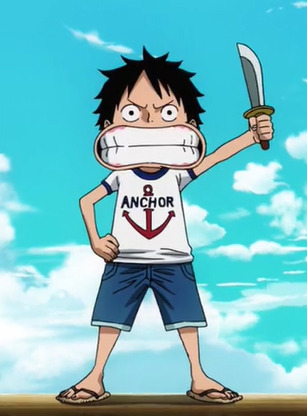
*Disclaimer: I don’t own this image - screenshot from Episode of East Blue
The last time I wrote this, I forgot to hit save and my browser just reloaded the page and lost everything. After that I just went “I’m done” and rage quit Tumblr for the night (which I normally don’t do). That’s how my Sundays usually go😒🥴
Now Onward!
Basic Classifications
Real World Ethnicity/Nationality: Brazilian
Class: farm / country / lower class
Culture (the one he grew up around): Dawn Island - Sea-side village
Fishing community
Farming / Ranching community
Hard work ethic
Small and close community members; relatively friendly; little to non-existent conflict
Selective mix of being open towards strangers (especially with merchant vessels for better trading opportunities) and weariness towards those they expect to be harmful (likes Pirates; I’d imagine the people of Windmill Village were understandably unnerved with the Red-Haired Pirates first showing up).
Core values (personal to Luffy): pride, physical strength, adventures on and outside his home village,
Relation to authority: neutral - shifting slightly towards negative (no clear basis of opinion; can only go off on Luffy’s fascination with pirates as the main viewpoint)
(The added information feels a little scatter-shot but figured I give it a try based on little information from the manga panels and how it lines up with real-world similarities. Most information is based on logical speculation and could change with new information in later chapters.)
I know that the Romance Dawn arc consists of the chapters up until he meets Coby and Alvida (I think...), but the depiction of Luffy’s character in the first chapter seems different from when he is seventeen and setting out to sea. So, I’ll treat kid Luffy as a separate character for the first analysis.
First Impressions and Introduction
Now, I am an anime watcher, first and foremost, so my first impression of this character stems from the Anime. My introduction towards this ball of chaos was when he popped out of a barrel, that he put himself into after realizing that a whirlpool suddenly appeared (how he missed it? - It’s Luffy), and then inexplicably took a nap in. That was the absurd reason I was able to stick with One Piece in the first few arcs (until Baratie became one of the major reasons I stuck with it - I’ll explain why when we get there).
And since the first chapter was used for episode four in the anime, I was already somewhat familiar with how the story started and who Luffy was as a kid. However, reading the first chapter felt....different than what I would’ve expected. And because the anime cut out a few details from the chapter, there definitely are some things to take from kid Luffy at that point.
So my first impression was, as follows:
The kid is unhinged...That explains some things...
Complete wild child of a backwater village from Day 1.
LIKE-- The anime episode DID NOT explain how he got that scar and the guy didn’t bring it up ever. To be fair, that wasn’t a big focus because the anime didn’t make it a focus. Reading that part though did more for his character and a little of his upbringing, through speculation, making it a rather slow-building but also fascinating introduction into this series.
Just a bit of an add-on, but if the manga introduced Luffy in the same level of neutrality as what the Anime did, It may not have fully made it clear if Luffy was going to be the main protagonist. Then again, it’s a shounen manga, maybe it was rather obvious to everyone else. Regardless, his introduction served to
(1) Make his entrance memorable
(2) Establish his character that could either compare or set him apart from his teen self.
(3) Act as a sort of precursor towards the introduction of Luffy’s world and upbringing (which isn’t completely established until the last few arcs of Pre-Time Skip)
Personality
The best way I could describe Luffy at this point is a stereotypical kid...
Energetic, short-tempered, adventure-seeking, easily impressed, and ignorant...
That last description is actually something I brought up in a separate post about the “Fluid themes” of One Piece. Because I found that a small but overarching part in many (almost all) themes and world issues that One Piece reflects has some level of unawareness or apathy. Jimbe put it best during the Fishman Island Flashback when they found Koala (paraphrasing)
“They are afraid of us because they don’t know us.”
Know us referring to acknowledging them as people on the same level as humans.
Because of that and plenty of other instances from the East Blue, it can be a potential center for many characters who go up against or wish to explore the world and find that they are a frog in a well.
And that’s what kid Luffy represents. A rather aggressive frog in a well that wants out.
Granted, he is a seven-year-old, whose schooling has a closer equivalent to the 16th and 17th centuries of our world, living in what appears to be a farming community, so I’d imagine his education only focuses on at least the basic levels of reading/writing, mathematics, etc. A small, unexciting farming village probably has more concerns over their melon crops rather than what the world has going on. Adding in Luffy, you get a kid who dreams about being a pirate and adventuring outside the isolated village, making him avidly interested in a world he has no experience with. Or in a world he thinks is all fun and games.
That’s pretty standard for any child that has a mild and peaceful life. No doubt Shanks and his crew would tell him stories about their adventures. Not as a sort of attempt to make him a pirate, but because he was easily entertained by it, building up this expectation with stereotypical pirate personas. And whether he has his “destructive” tendencies before they became a fixture in Windmill Village, they definitely seemed to amp it up enough for Luffy to try and prove he was “man enough” to be a pirate at seven years old.
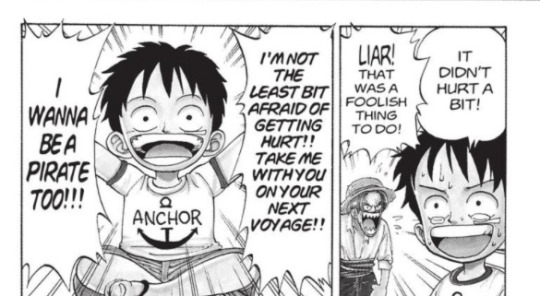
Then when you add in this idealistic expectation with the selfishness of a young child, it creates an opportunity to learn. Because, as any kid may go through, will find that their fantasy of the world won’t be what they expected, and will often react negatively. Luffy’s expectation of Shanks is that he is the strongest man worthy enough to be a pirate.
Now, Luffy’s view of a “real man” stems a lot from this stereotype of men solving their problems through fighting only. Which also embodies this rather damaging philosophy of never running away or backing down from a fight (which I refer to as stupid bravery - something that comes up in a certain other character).
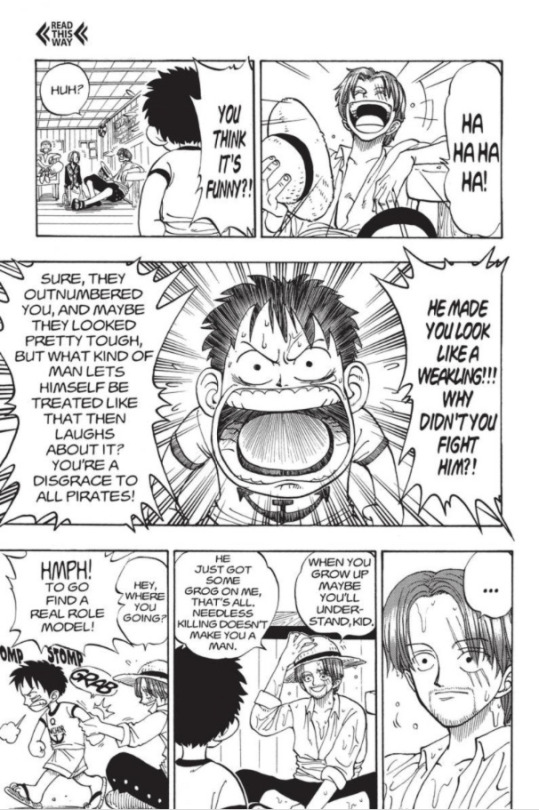
The amazing thing about all the combined aspects of this kid is the ability to create a learning lesson for Luffy. Which can become a motivational factor in his pursuit as a pirate.
His easily impressed nature makes it known both when the Red-Haired Pirates talk positively about piracy adventures and when Shanks leaves the village. The difference between the moments can be showcased by the difference in determination and will to make an effort to achieve his dream. As he declared he wants to be King of The Pirates, he sets himself to work at it, rather than try and go with others.
How He Shapes the Story / World Around Them
I don’t know if anybody else made a similar connection (I wanna say someone DID but I can’t remember where) but in combination with Luffy’s general enthusiasm growing up hearing wild stories, his narrative reminds me so much of Don Quixote De La Mancha.
It’s been a while since I last read that story-- and by read I mean translate some paragraphs from Spanish to English during my Spanish I class in freshman year of high school. Nonetheless, I thoroughly enjoyed the story. Part I entails an old man who, after indulging himself with various stories of knights and valor, decides he wants to partake in his own adventures. Under various delusions and misadventures, his story becomes a rather well-known one.
Don Quixote was called the first “modern book”. That was something my Spanish teacher mentioned regarding its acknowledgment by the world and always stuck with me. It was one of the first stories of the early medieval period to focus on a regular man. Other stories before this tended to be about legends, gods, demigods-- individuals who often were referred to as legends because they were born into high status (often above humans). Either through original texts (often for religious purposes) and then through varying interpretations (such as the Arthurian Legends), these tales were a part of the status quo.
Kid Luffy is a person that reflects so much of the Don Quixote story (And not just because his village has windmills-- the most iconic scene about the knight’s story). He is that simple, normal boy that longs for his own adventures when there seemingly is already a well-talked-about story about someone who achieved infamy. In place of that is a man named Gold Roger whose execution we see in the manga’s opening. At this point, we don’t have much understanding about how it impacts the world as of yet, we just know it is setting up for something significant to the story.
Luffy becomes that “regular” person from a small-town with big expectations for a grand adventure.
That perspective can slowly build into the story by starting in a simple setting with a character going through one of the first dynamic changes in his life. Luffy’s experience with Shanks’s sacrifice sets a course in his own adventure. A story that trails into a rather bonkers adventure at the end of chapter 1.
His development is what shaped his world. It’s the way he learns when as it stems from the consequences of his actions. Especially ones where the smaller ones turn out to be very costly, making it a hard lesson that ingrains into the young kid. His actions created by his old ideologies sparked an intense reaction in the people around him. Especially Shanks, who felt he was worth losing an arm towards.
How The WORLD Shapes HIM
So, for the sake of the fact that kid Luffy’s “World” in Chapter 1 mostly consists of Windmill Village, I’m adding in Shank’s and his crew’s influence to extend and further give credence to his influence. Because, as of this point, Shanks represents a glimpse into the life of a pirate that Luffy strives for.
With Luffy being in a quiet environment all seven years of life, there is growth through basic schooling and healthy child development (theoretically since Makino seems to be the most likely one acting as his guardian), instead of doing things outside that norm. Now Shanks is the odd factor that creates new development into Luffy’s dreams and future ambitions.
The crew’s stories, charisma, and connection towards the kid actively (and probably unintentionally) created a positive expectation if he chose to pursue his dream. While that sounds inspiring, there were also negative aspects. Such as driving his ignorance and impatient nature to seek it out too early in his life.
Shanks then became a mediator. Luffy often has mixed feelings with Shanks as the man begets a level of encouragement while verbally making fun of Luffy for being a kid constantly. Despite that, it doesn’t completely deter Luffy’s ambitions. All it does is slowly drop his high expectations in Shanks after the first bar incident. This is again done by his childish outlook of physical strength and bravery equating to his ideal of a real man.
With Higama, Luffy learns about real-world dangers, and how bravery won’t always be enough to win battles. The same can be said for physical strength but at that moment it doesn’t apply to Luffy.
Shanks’ and the crew’s involvement helped Luffy’s views change. His expectations are fulfilled, which in turn reveal that he was wrong about them.
Finally, seeing Shanks’ sacrifice unfold drove Luffy into a pang of newfound guilt. By then, he was able to change one part of his world views from a childish fantasy into the beginnings of a mature way of thinking.
He gains some level of patience. Along with a set goal to work with. Attributes which are identifiable with Luffy in the chapters last few panels.
Patience = Luffy took time to train and learn to set sail at age seventeen.
Set goal = Be King of the Pirates
Add-Ons
When I say that kid Luffy, after Shanks’ sacrifice, gained a level of patience, it is meant as a deduction during that chapter. By no means am I insinuating that it became a permanent trait for his character. Because as of chapter 1, all of Luffy’s personality has yet to be revealed.
And this will apply to other posts for various characters. They may behave in ways during or in response to a particular event but it doesn’t necessarily equate to that becoming a whole personality trait. Calling Luffy patient, with having full acknowledgment of his personality during the bulk of One Piece, is completely off. But, there can and will be moments where Luffy will act patient when he deems it necessary.
This is a little hard to articulate but I hope it makes enough sense.
🏴☠️🐒
After-Notes
Here’s my first attempt at this analysis. It felt scattered even after editing everything. Breaking down characters sounds easy (and most times it is) but articulating and connecting things takes a lot of work.
Here's to hoping it gets easier with the next character. And maybe shorter paragraphs.
Up Next: Shanks (East Blue)
#OPA#One Piece#East Blue Saga#Romance Dawn Arc#Monkey D. Luffy#Chapter 1#One Piece Characters#Worldbuilding#Analysis
14 notes
·
View notes
Photo
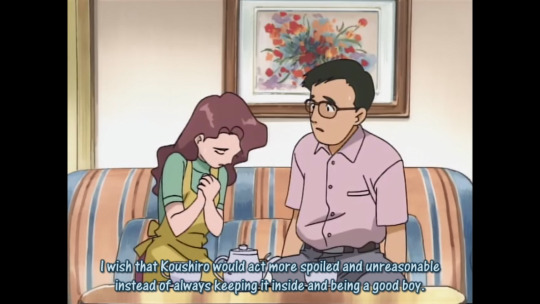

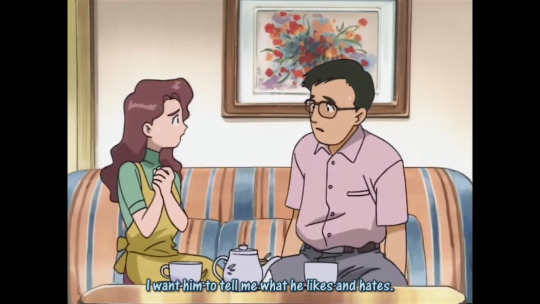
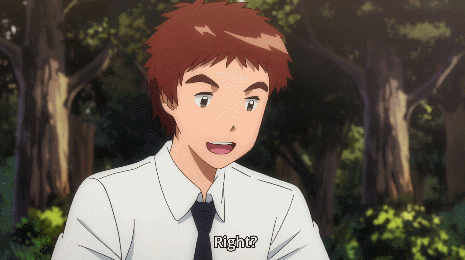
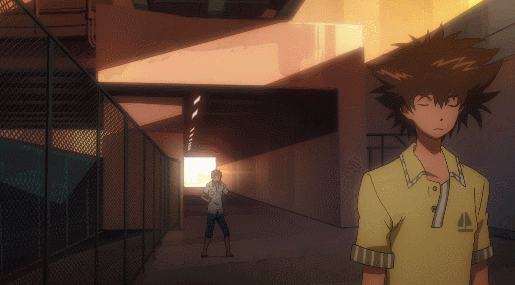
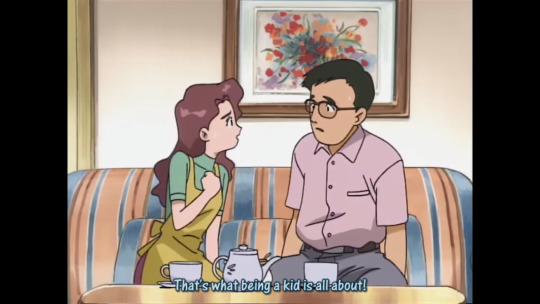


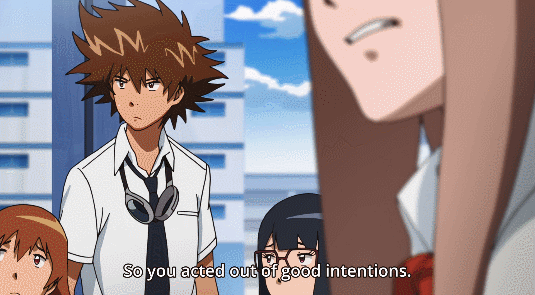
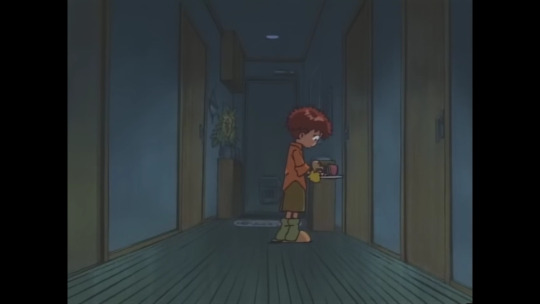
Digimon Adventure x Digimon Adventure tri ~ featuring CHARACTER: Koushiro[u] Izumi [Koushiro “Izzy” Izumi in US dub] (+relationship with Mimi Tachikawa) [+Taichi Yagami] + IMPORTANT DIALOGUES (in Adventures & connecting to tri.) + CHARACTER/STORY PROGRESSION
also known as: KOUSHIRO vs. COMMUNICATION {further a.k.a: Communication Is Hard.}
{the following related quotes and information relates more specifically to Tri!Koushiro. There will be minimal spoilers for both his & Mimi’s roles in tri, without majorly spoiling the ending / plot surrounding Meiko.}
“I WISH THAT KOUSHIRO would act more spoiled and unreasonable instead of always keeping it inside”
“like a 'GOOD BOY’”
“I want him to tell me what he LIKES”
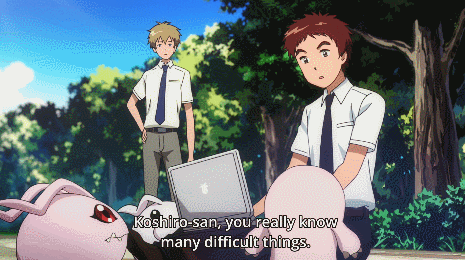

“and” “HATES”

“That’s what being A KID is all about!”
“...Don’t you think so?”
- Mrs Izumi, Adventure Episode 31 (Japanese version)
{... Or maybe it would have been better if you
NEVER SAID ANYTHING AT ALL.}
- {Koushiro, internally, @ himself, Often, Probably} [?]:
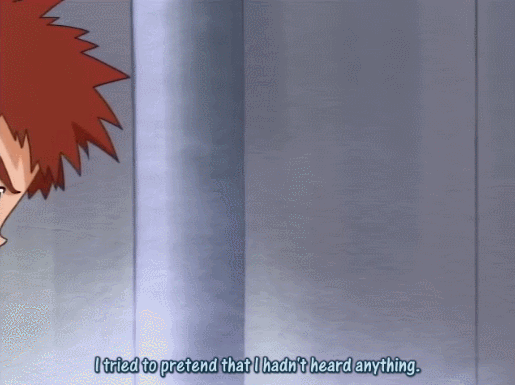

Original Posters’ {Mine} Commentary:
{Some Food For Thought TM, Maybe}
(a refresher, of relevant Koushiro backstory potentials from the novels written by Adventure director Kakudou!) {I tend to refer to these passages a Lot when discussing or analyzing Koushiros concepts for Reasons}: [with translations thanks to Onkei; as tumblr refuses to show posts with links in the tags nowadays, please check in comments if you want the links to novels, thank you!]

- from the opening chapters; when lost on File Island
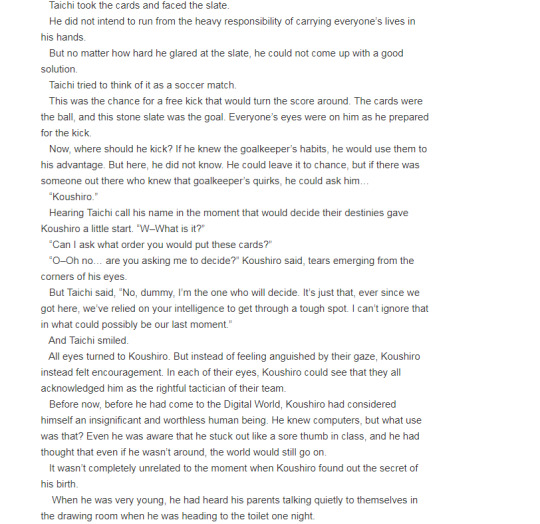
- from the part covering Adventure episode 28; a.k.a. “the Gate”:
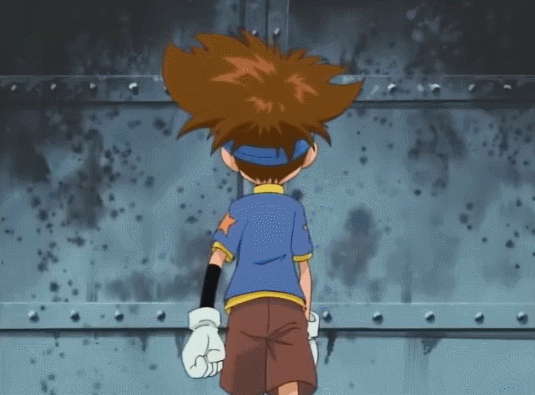
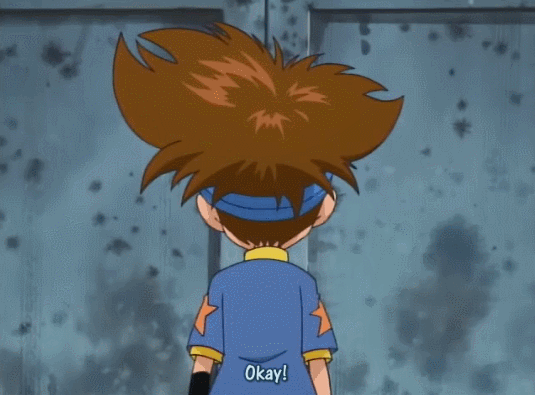
“Before now, before he had come to the Digital World, Koushiro had considered himself
an insignificant and WORTHLESS human being.”
{Note: it should be important to be kept in mind that Koushiro within this point of the pre-series story [Novels, above] is 10~ years old and he’s been feeling those things SINCE HE WAS A TINY CHILD [Ages 5~10].}

{“THERE’S NOTHING WRONG WITH BEING [INTO/OBSESSED WITH] COMPUTERS!”} [Note: in novels, it’s translated as “obsessed with”.]
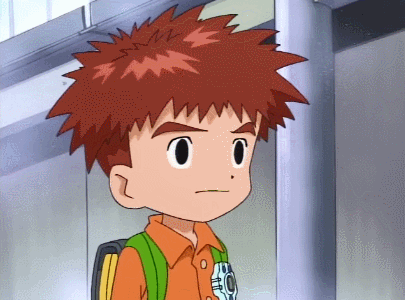
BONUS:
{from later in the same sequence of Adventure #31, above}:
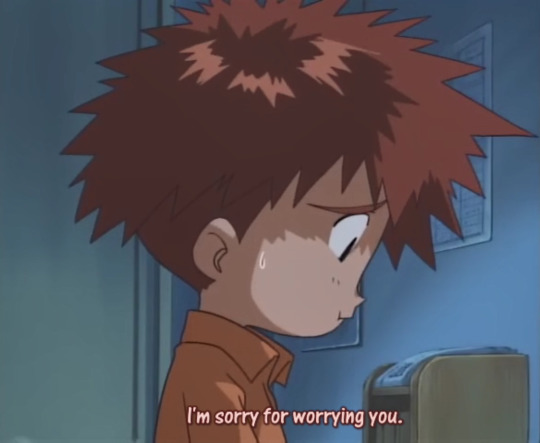
{from later on in Tri; Kyousei ending}:
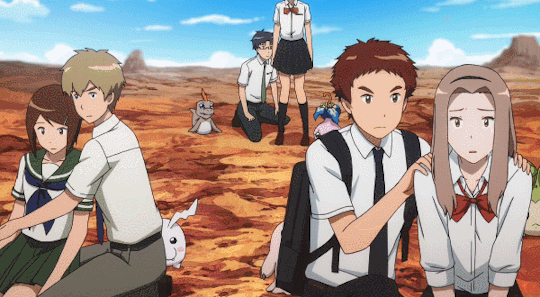
THE BIGGEST BONUS:



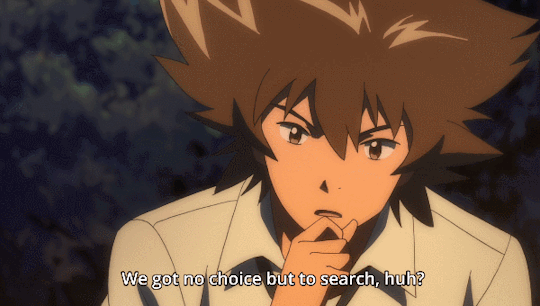
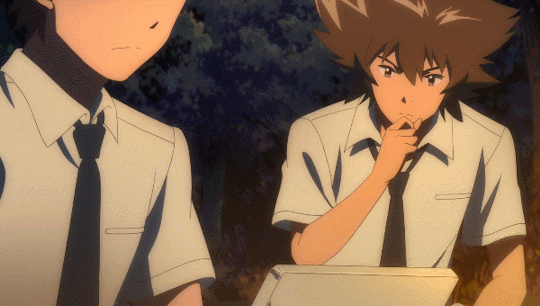
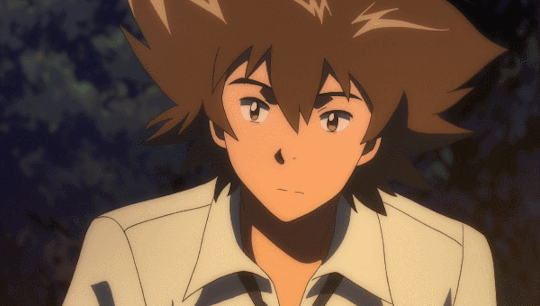
tri. head Director Motonaga: As tri. is connected to 02, the entire theme of this work is depicting what the first generation of Chosen Children would be thinking about as they become adults.
Because the question of what kind of adults they’ll become has already been answered, we’re working on the problem of getting to that answer, in a sort of reverse problem-solving.
(on Koushiro) As Koushiro begins to try changing his clothes in Part 1, he wants to become someone who can do something by himself.
- Otomedia, February 2016 (Digimon Adventure tri. interview) [with translation credit thanks to website DigiLab Blog!]
“what they were learning in Tri.”: (KOUSHIRO):
“ After understanding about himself, GAINS ABILITY TO UNDERSTAND OTHERS. Learns to easily/OPENLY ACCEPT OTHERS’ LOVE TOWARDS HIM .”
- from a post-Tri livestream interview given by Kazumasa Habu (who, along with Kenji Watanabe and Mr. Maekawa, are members) of the Digimon Staff that works with the LCD Virtual Pets [with translation via Onkei]
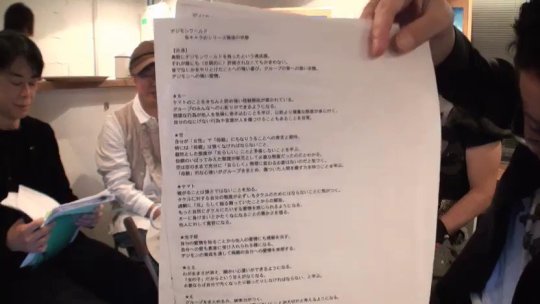
{pictured: Habu holds up the planning sheet for Tri.}
MIMI - ‘selfishness’{-like quality, aka ‘Jikochu’ in Ketsui} disappears, learns to be courteous towards others
[&] Learns not to expect others to be sweet on her "just because she's a girl." {<- this includes Koushiro Izumi!} learns that when it's necessary, she'll have to get dirty herself and give in to things.
start of {Kokuhaku} / {Confession} [Movie #3]:
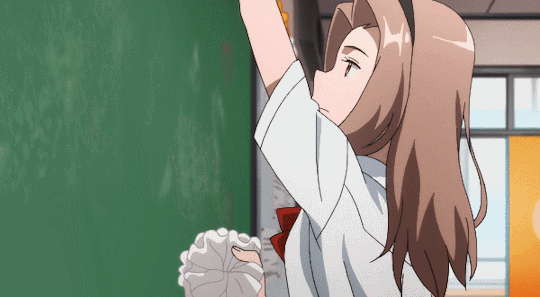
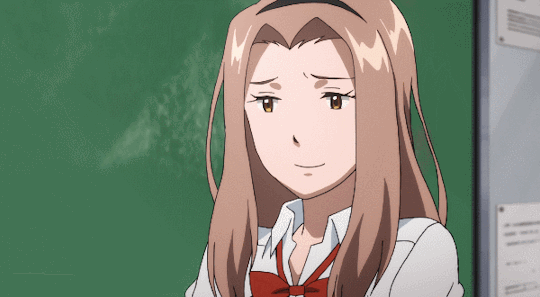
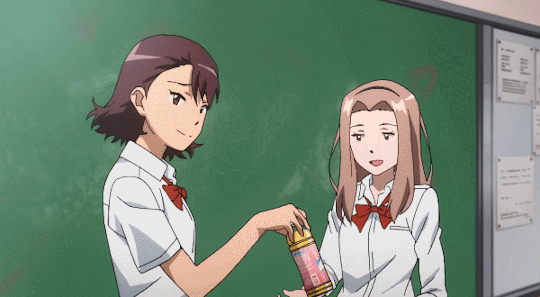
(earlier on, as well), {Ketsui}:

{Kyousei} / {Coexistence}; Movie #5: {when she becomes stuck in a familiar-to-the-viewers setting with Tentomon}:
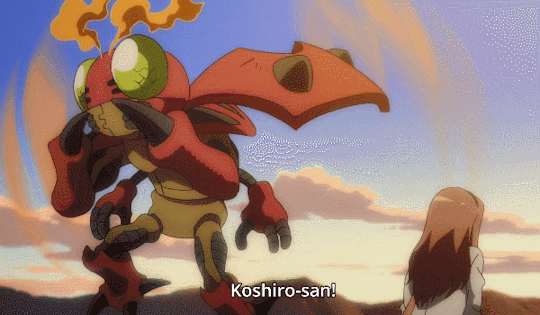

[hey, wouldn’t you know, she’s very clearly not upset with Koushiro anymore?]
{Kizuna}:
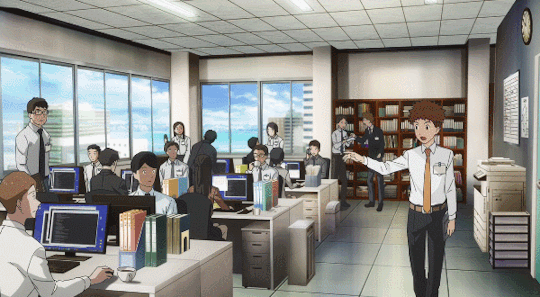
[the last we have of Original!Koushiro so far, from the credits; he’s now the head of his own company, having learnt how to UNDERSTAND others while openly ACCEPTING LOVE towards HIMSELF, from the people who CARE about him, {and even simply learning how to communicate in TEAMS}]
(people who CARE ABOUT HM): {ALSO KNOWN AS: HIS FRIENDS} & {HIS FAMILY}

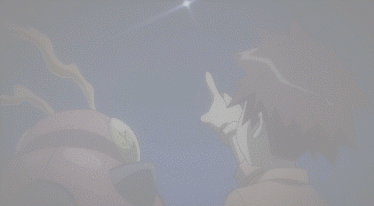
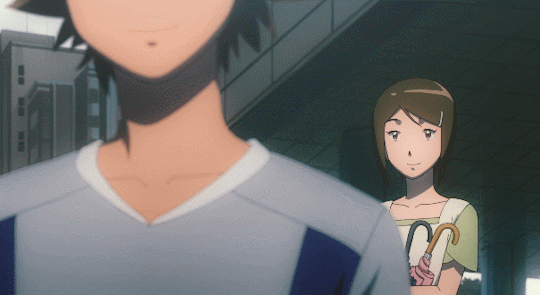
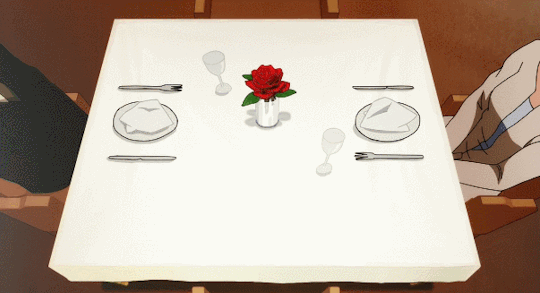

“KNOWING NOTHING is just a chance to learn new things, RIGHT?”
“PLEASE KEEP LEARNING NEW THINGS,
... AND ENJOYING IT.”
{Note: this post is part of a series discussing Koushiro using canonical references and quotations from the original Japanese version [and not the U.S. dub] to attempt to explain his progressing storyline; you can view more of my headcanons thoughts and analysis at my Neurodivergent Koushiro analysis series!}
caps/gifs by @izzyizumi,
{DO NOT REPOST} {DO NOT REMOVE CAPTION} {DO NOT USE MY POSTS FOR ARGUING OR DISCOURSE} {DO NOT COMMENT / TAG WITH SERIES / CANON HATE} {OTHERWISE YOU WILL BE BLOCKED} {THIS ALSO APPLIES TO TAGGING/TAGS ON THIS POST.} {usage of gifs may be allowed if permission is asked / or if credit is given. However, read my about & FAQ pages first. Please do NOT use / ask if you match anything in my “Do Not Interact” sections.}
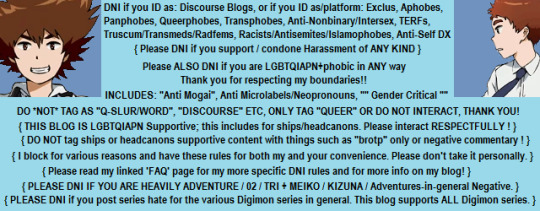

{Additional note: this post is mainly intended SPECIFIC CHARACTER/POSITIVITY FOCUSED. please remember + RESPECT this when interacting {Failure to acknowledge interacting rules WILL result in a block}

[Note: commenting/tagging positively/respectfully is ok!] (Please AGREE TO BANNERS BEFORE interacting) (Note: click on the banners to enlarge!)
REGARDING GIFS USAGE:
- they must NOT be used to spread negativity for the canon/fandom! {INCLUDES: in regards to Adventures AS A WHOLE, Adventure (Original series), 02, Tri, Kizuna, Adventure & 02 movies, Drama CDs, any spinoff materials} - they must NOT be used to promote shipwarring within the fandom - they must NOT be used to attack any Adventures character focused on - IF I SEE YOU DOING THIS I WILL LIKELY BLOCK WITHOUT MERCY {usage may be allowed IF PERMISSION IS ASKED TO USE.}
{Please also LIKE this post if you are wanting to use!} {Once you have “Liked”, feel free to contact me to ask for permission!} {However, read my about & FAQ pages first. Please DO NOT use / ask if you match anything in my “Do Not Interact” section.} {I MAY POLITELY DECLINE USAGE REGARDLESS. Please do not take it personally!} {if you are unsure if you can use you can SEND ME AN ASK} {I will check your blog; if you do not match anything on my “DNI”; [CHECK THE FAQ FOR MY DNI SECTION/S] you will likely/may pass the check and can use!} {However please note my ENTIRE FAQ sections on such} {It is possible I may not grant permission for other reasons} [i.e.: You post a lot of something I have blacklisted]
#digimon adventure tri#digimon adventure tri.#tri koushiro#ketsui spoilers#izumi koushirou#tachikawa mimi#yoshie izumi#yagami taichi#koushiro meta#tri meta#taichi and koushiro#koushiro and mimi#koushiro tls#koushiro refs#izzyizumi posts#izzyizumi gifs#izzyizumi tri gifs#izzyizumi tri koushiro gifs#tri koushiro meta#autistic koushiro#autistic koushiro series#autistic koushiro headcanons#koushiro and empathy#koushiro and communication#low empathy koushiro#(THAT ASIDE WHOO BOY I have a LOT OF COMMENTARY on Koushiro and Communication and whoa here have all these direct quotations to connect it)#(this is only the start SORRY I have to make like 10210200120120 more gifs and videos to explain every single Koushiro scene Apparently)#(you know???? it'd be cool to stop seeing people constantly trashing my fav because of mischaracterized fanon that ppl INSIST on spreading?)#(look.... look i'm trying to be patient anyway if you could PLEASE consider most of the references i'm showing here i'd greatly appreciate)#(me 'hey??? hey all??? HEY can we please consider NOT trashing any aspect of canonical Koushiro you know that one who is ADOPTED????')
19 notes
·
View notes
Note
So, as someone whose father is very similar to Endeavor, I've never understood the notion that Horikoshi is trying to whitewash or excuse his abuse by giving him a character arc. Abusers are awful people, but it's not often that they're one-dimensional villains. Nobody ever talks about how confusing it is when your abuser wakes up and sees the damage they've caused, much less when they clumsily try to make ammends. It seems fans would rather it all be simple, when it's anything but in reality
/2 Are there ways it can be handled better? Of course. But a writer making an effort to explore the complexities of abuse through all its angels is far from abuse apology. It’s much more respectful (imo) to treat the situation like the confusing, complicated mess it is in reality, rather than reduce it to some simple cartoonishly evil bullshit that either limits the survivors of his abuse to being lifelong victims, or enables the continued abuse perpetuated by a former victim (i.e., Dabi)
Hello, I’d like to thank you for sharing your thoughts and opinions. I was actually surprised to open up Tumblr to see your messages in my inbox. I spent the past couple of days sitting on and thinking about it. I’m not sure if you were asking for my thoughts and opinions, but I’ve finally sat down and written my response. It’s late at night so I apologize if there are any statements below that are poorly worded or expressed.
As you express, it’s a very complicated topic as a whole, because Endeavor, or Todoroki Enji is a complicated character.
I can not and will not claim that I understand abuse like those who have experienced it. Additionally, It’s not in my place to tell people how to feel or think. However in response to what you shared, I will give some of my thoughts as a reader and fan of BNHA on the topics surrounding Endeavor. (Btw to the anon: some of what I have to say below will be my general opinions about the topic as a whole.)
When I try to write meta and other analysis pieces, I try my best to go back to the manga and base my analysis and arguments on the (official) translations instead of my opinions and thoughts from the beginning. I sometimes have to go back and re-read chapters to remind myself what is “canon” and then try to understand and express my interpretations on the matter. This is not to talk down on those who do not do this: this is just something I do for myself. I am most definitely influenced greatly by what others have to say but I also want to figure out my own interpretation of the story and characters.
So, as someone whose father is very similar to Endeavor, I’ve never understood the notion that Horikoshi is trying to whitewash or excuse his abuse by giving him a character arc.
I personally never really saw it as Horikoshi trying to excuse Endeavor’s abuse by giving him a character arc as well. As many others have stated, I don’t see it as a “redemption arc,” because it isn’t.
I think that we all have to remember the diversity of the fans and readers of this and other fandoms. There are those who can personally relate to or understand what the Todoroki family has gone through, and others who are unable to. Those who are unable to fully understand certain experiences but can sympathize with the characters however even then, this lack of knowledge or exposure to the topic has led to people accidently expressing opinions that hurt or offended others. Additionally, based on what I’ve seen and read on Tumblr, there is quite a wide range of differing viewpoints from those those who can relate to the experiences of the Todoroki family.
Abusers are awful people, but it’s not often that they’re one-dimensional villains. Nobody ever talks about how confusing it is when your abuser wakes up and sees the damage they’ve caused, much less when they clumsily try to make amends. It seems fans would rather it all be simple, when it’s anything but in reality.
Abuse is complex. There is a very wide range of complicated feelings, emotions, thoughts and opinions that surround it. Everyone has a reason as to why they feel or think the way they do. Because we all have had different experiences and reactions to the events of our lives, we can not expect everyone to think similarly.
Given that BNHA or shounen manga in general is catered towards a younger audience (compared to, lets say seinen manga) and Horikoshi is working with topics that are difficult to read or understand even for adults, I’d argue that part of the discourse may result from that.
It seems like when we say that we like a certain character, people tend to automatically assume then that we approve of what they stand for and what they’ve done. I first watched the first two seasons of BNHA before I began reading it. I absolutely hated Endeavor in the beginning, however after I caught up in the manga and began to follow the chapter releases each week, ultimately the characters that really pulled me in to the story was Endeavor, Hawks, and Bakugou, arguably some of the most controversial characters of the series.
Are there ways it could be handled better? Of course. But a writer making an effort to explore the complexities of abuse through all its angles is far from abuse apology. It’s much more respectful (imo) to treat the situation like the confusing, complicated mess it is in reality, rather than reduce it to some simple cartoonishly evil bullshit that either limits the survivors of his abuse to being lifelong victims, or enables the continued abuse perpetuated by a former victim (i.e Dabi)
What truly drew me in was the complexities that came with their characters. I haven’t personally experienced abuse however I have lived through other experiences to recognize in my own understanding that life is both so negatively and positively complicated, confusing and messy. Some people want to see Endeavor fall, and others hope to see him actually change. These wishes are shaped by what we’ve seen or experienced throughout life.
We like simple, clear cut, perhaps one dimensional characters because it’s easier to form an opinion about them. It seems like we struggle with characters like Endeavor and others because we are sometimes faced with the contradicting collision of our own thoughts, morals and beliefs with the actions and story of these characters.
For some reason a lot of my analysis posts have revolved around Endeavor, Hawks, and Dabi and if anyone is interested, I personally believe that as much as we may love a character, whoever it may be, actions should and will be met with consequences. Tragedy does not excuse one’s actions. They may explain one’s actions but we are responsible for and should be held accountable for the consequences that result from it.
If anyone was thinking it, this all does not mean that I think Horikoshi should be exempt from critique. And as you ask and answer, “Are there ways it could be handled better? Of course.” Additionally as I have written on the top of my blog,
There will be posts found here that you may not agree with, however different perspectives are what keeps the meta conversation going.
I think that many of us would prefer it if people would refrain from accusing, insulting or bullying Horikoshi and other fans because of their thoughts and opinions. Although it is understandable that it is difficult when we respond to the story and others emotionally, taking part in these types of activities is not the same as critiquing something.
Boku no Hero Academia is still an ongoing manga. We get one chapter every one or two weeks at a time and so we only get little snippets of the full story. Based on new info and what we’ve read in past chapters, we make predictions, assumptions and have expectations about the future. However, I think that we all have to remember that the story of Enji, Rei, Touya, Fuyumi, Natsuo and Shouto is not complete yet. We are still in the midst of an unfolding narrative that Horikoshi is working closely with to present his readers.
19 notes
·
View notes
Text
“He doesn’t take himself into account...”
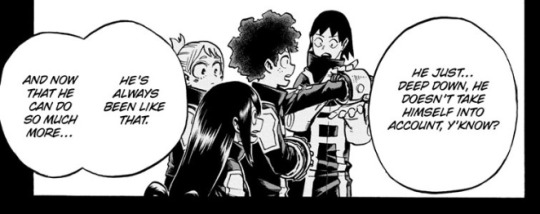
I was contemplating how Deku’s fatal flaw of “not taking himself into account” is going to be resolved, and, assuming that it’s going to be in the form of some kind of talk with his friends/family/peers/mentors, here are some of my ideas on the problem itself and how some characters might approach it (A.K.A. 80% of this is in regards to Bakugou and then there’s a paragraph at the end about how Shouto relates to Deku, because I haven’t thought enough about the other characters yet. There is no cure for “Head empty, just-Bakugou” syndrome):
*Manga spoilers up to ~295*
I've seen debate over whether or not Deku does indeed have a self-worth problem, and while I do agree that it is a factor, I also think it’s a little more complicated than that. The way I see it, Deku is a lot like Bakugou: he hinges his self-worth on whether or not he can save everyone, much like how Bakugou hinges his self-worth on whether or not he can achieve a perfect victory. They both have unstable egos which fluctuate depending on whether or not they can fulfill their ideals.
So I don’t think it’s quite as simple as Deku thinking: “Everyone says I’m worthless so they must be right,” but it's more that he’s constantly trying to challenge that label. He has the confidence/perseverance to think, “Everyone says I’m worthless so I have to constantly prove them wrong—and more importantly, I have to prove it to myself so I don’t actually succumb to the even deeper fear that maybe I actually am worthless after all.” So essentially, Deku’s constantly under the pressure of people’s expectations of him. And this pressure comes from more than just society once Deku is bestowed with OFA. Sound familiar?
Well, it’s a lot like how it was for Bakugou. Deku came into the world graceless and unskilled, even before being diagnosed as Quirkless, so the world formed that perception of him accordingly. Deku was deemed worthless, so he feels the need to surpass that designation out of fear that he will regress to it if he doesn’t meet his goals. Bakugou was a natural-born talent, even before getting his Quirk, so the world had high expectations of him to be good at everything, always strong, and never require help. So for Bakugou, if he fails to meet those standards, his self-esteem drops and he feels similarly weak (though he's now outgrown this to some extent).
More specifically, Deku now has one of the most powerful Quirks in the world, OFA, which comes with very high expectations—not unlike how Bakugou’s Quirk, Explosion, is very powerful and as such comes with a similar expectation that he must be the strongest and better than everyone else. In Deku’s case, however, it’s a little different because OFA is tied to a kind of legacy-driven destiny: it was created for the sole purpose of defeating AFO (the person, and the Quirk, I suppose—the two are so entangled, reasonably). Deku has gotten to the point that he feels the full weight of this expectation, and that he’s desperately afraid he won’t meet it. So in his mind, he has to fulfill the goal of OFA, even at the cost of his own life. Not just so All Might, who chose him, won’t regret his decision, or that others will be disappointed in him, but also because the fate of the world & people’s safety very much hang in the balance. Furthermore, as a OFA user, he feels that it’s his responsibility to deal with AFO and nobody else’s, which is probably part of why he’s reluctant to rely on others’ help.
Deku pledged to Bakugou that he would make OFA his own, and Bakugou often checks up on his progress for that reason, so I think it makes sense that Bakugou would be involved in trying to remind Deku that he is his own person outside of OFA’s own goals. It’s a bit like how AFO quite literally possesses Shigaraki to pursue his own goals: OFA (the person/the Quirk?) does the same by overriding Deku’s dreams and well-being, even if it’s for a noble cause. I think Bakugou very much recognizes how OFA is cursed in this manner too (though at the same time, he’s acknowledged that it’s done a lot of good too and has the potential to do even more).
Additionally, Bakugou also benefits from Deku making OFA his own: so they can finally settle once and for all, who the better the hero is (he also wants it for Deku’s own sake too, of course). A “Deku vs. Kacchan 3” is in order for that reason, but I don’t think it’s going to be in the conventional format of a brawl, because at this point, it’s clear that raw power alone is not enough to become the best hero. So we’ll see how that goes.
Despite all of this, would it still be valuable for people to remind Deku of his own inherent self-worth? Perhaps. I think Deku could benefit from relating to Bakugou most on how failing to meet your own expectations doesn’t automatically make you weak/worthless/a loser.
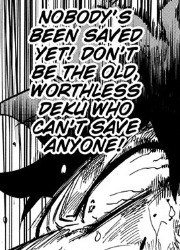

Because I feel that there’s a fine line between feeling motivated to get back up again after failing vs. having your self-worth plummet if you fall just below the standards you’ve set for yourself. And Deku and Bakugou toe that line a lot. How would you reconcile this issue, you ask? Well, I wouldn’t personally know, because:
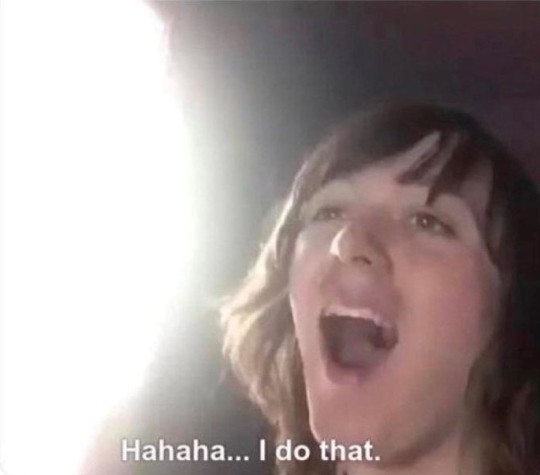
I still feel that Deku & Bakugou’s tendency to fall into that pit of self-negativity is a little unhealthy… but that could just me. I think Bakugou having a similar guilt complex, where he pins a lot of blame on himself for his mistakes (which is sometimes overly harsh/misplaced), is also not the best mentality. I’m still of the opinion that Bakugou’s continued sense of responsibility (read: guilt) over All Might’s end is somewhat misplaced/misguided, even if well-intentioned, but again, we have yet to see the narrative confirm this as a lasting issue or not.
Which brings me to Bakugou’s sequence of thoughts/recollections in 285: Bakugou Katsuki: Rising. Again, I think it’s important to keep in mind that Bakugou has a tendency to be a little harsh on himself, so his own perception of his culpability in influencing Deku may be a tad overblown (this also applies to any narrator when we see the story from their perspective: they’re always going to have their own biases).
I’ve read and re-read Bakugou’s flashback sequence as he begins to rise, and because Bakugou is such a visual thinker and less of a linguistic one, his flashbacks, without proper wording, can be vague. I think there’s multiple ways you can interpret this sequence, and while at first I was confused by it and found it disjointed, I then tried looking at it as a kind of thematic, three-act structure, where the images all sorta build on each other.
When Bakugou thinks of OFA as a “cursed power,” he flashes back to middle school when he mocked Deku’s desire to apply to U.A. in front of the class.
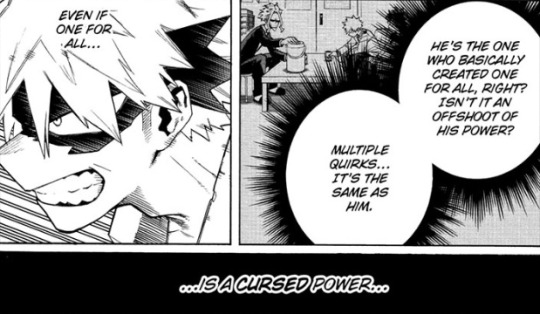

And then when he thinks about OFA in a positive light, as associated with All Might, he focuses on All Might’s face and then flashes back to Deku’s hero notebook that he blew up and tossed in the pond, which is again, another rejection of Deku.
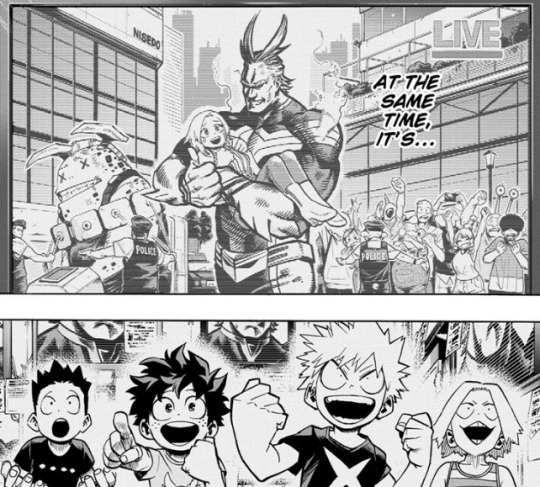

And then he remembers Deku pushing back against him instead in Deku vs. Kacchan 1, when he tells Bakugou he won’t be his “worthless punching bag Deku forever,” pledging that he’ll from now on be “the Deku who always does his best.”
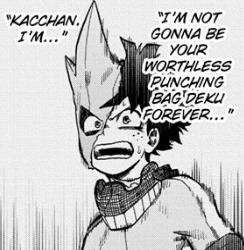
Except the next image we get of Deku in place of the past, positive one, is one of him destroying himself in real time, where he appears ominous, haunting, almost kind of mad or possessed. And Bakugou is not pleased by it.
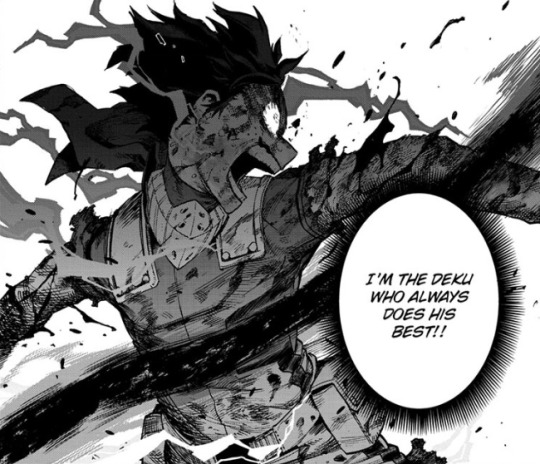

So one way the pattern here could be read: Bakugou recalls all the times he put Deku down, only for him to get back up again, which parallels how Deku reacted against society’s "worthless" perception of him. This also kind of works in conjunction with another pattern: 1) Deku (while in possession of OFA) is conflated with AFO/OFA, 2) Deku (while in possession of OFA) is conflated with All Might, 3) Bakugou’s conclusion: Deku isn’t quite either of those and is instead, his own person. OFA is his own and exists to serve Deku’s goal of being “the Deku who always does his best.” The only problem is that the Deku here hasn’t quite realized that yet.
Either way, it seems like Bakugou feels he at least partly contributed to this marginalization of Deku. Maybe a part of him thinks, "If only I'd been supportive of him from the beginning… then maybe he wouldn't be like this now… that he wouldn't be in this position…"
While, as compared to where he was at during DvK1, Bakugou does now accept the new meaning of “does his best” Deku, at the moment, this Deku isn't currently matching up to that version. The distinction here is that this current image of Deku isn’t a positive one, it’s negative.
It’s a picture of Deku destroying himself for a dream which isn’t his, perhaps out of a sense of obligation. Because as Deku puts it, he feels blessed for all he currently has: for being at U.A., having All Might as his mentor, and being able to have a normal-ish conversation with Bakugou.
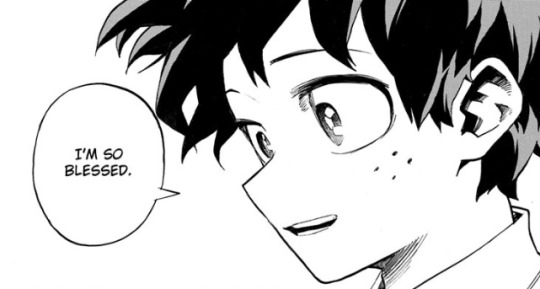
But he still has this imposter syndrome way of thinking that he got this all through luck, that he’s undermining his own virtues and skills. Possibly because he does have low self-worth. I think of it like this: Deku is probably aware on some level that OFA comes with risks, that it has a lot of baggage and is probably kind of cursed, but Deku’s so grateful for the chance to become a hero, and desperately so, that he’s willing to accept even the worst of consequences to himself.
Here’s a good comic from a Japanese artist on Twitter that encompasses this idea of OFA taking advantage of Deku’s hero ambitions, before Bakugou stops him: https://twitter.com/j_nobu4/status/1344244583148863488?s=20 (rough translation in the replies, but you get the gist from the images). I think it’s a surprisingly accurate depiction of canon events, and partly inspired a lot of my ideas here!
Either way, it probably doesn’t help that All Might conveniently forgot to mention all the warning labels and side effects that come with OFA before giving it to Deku, but I digress.
And I think it’s also possible that, because he’s so grateful and feels like he’s been gifted with this new, privileged life, a part of him is afraid that he might lose it all—his friends, his life at U.A., All Might’s approval, OFA itself—if he fails to meet the expectations set out for him. That maybe he won’t deserve it anymore. I mean, hell, he already tried to give Mirio OFA once before—it’s probably no coincidence his “better” showed up to the Shigaraki fight to make him feel inadequate again. Not only that, Deku never expected to be able to speak to Bakugou again. And yet, in a sad kind of way, it was only after finally getting a Quirk, OFA, that the two are given a means to reconnect again.
I admit all of that is a bit convoluted, but either way, I feel like Bakugou does feel guilty for belittling Deku, and that it could be helpful for him to remind Deku of his own inherent worth outside of OFA, even more than just as a hero, but as a person. Because someone’s worth shouldn’t just be based solely on how many people they save or how many battles they win. Every human being has value simply for existing. And that’s mainly why Bakugou jumped in to save Deku at the end of 285. It wasn’t because he was consciously thinking about OFA getting lost/stolen, or reconciling with Deku, or Deku losing his dream, or his even own ambitions. At that moment, he simply had that instinct to save someone who was in trouble.
I think the person whose words would have the most effect on Deku in this case would be Bakugou. Firstly, Bakugou was one of the main people in his life who constantly belittled him and made him feel worthless (obviously not the ONLY cause, but one of the major ones). I think, in one sense, not only does Deku highly value Bakugou’s opinion, it would also be quite validating to have the person who used to think you were worthless tell you that you really aren’t. It’d mean a lot if Bakugou, who gave Deku his deprecating nickname in the first place, revealed to him that he now acknowledges the new, positive meaning of it. Of course, it’s still unclear, from Deku’s perspective, how much he holds Bakugou accountable for how he treated him, so whether or not this would mean much to him is still in the air.
Anyway, on the note of Deku making his Quirk his own, an abrupt segue: I feel that Todoroki can also quite relate to that dilemma. After all, Deku was the one who had to break Shouto out of the mentality that his fire was an extension of his father, rather than his own. So a similar “It’s your power, isn’t it?” moment would make sense here. Both Deku and Shouto have this legacy that’s thrust upon them, but they shouldn’t necessarily be beholden to upholding them.
I think one of the main themes of BNHA is about legacy, and the trend, to me, is that the current generation can learn a lot from the previous generation, but ultimately, the heroes of now have to form a new, improved legacy, however that may be. After all, the current hero society is very flawed, and heroes like All Might and Endeavor contributed to its state (for better or worse), even if they also had merits at the same time. OFA and AFO, too, mimic that concept of legacy, in that the Quirks started as a feud between two brothers, and that it shouldn’t be Deku or Shigaraki’s responsibility to resolve it. Rather, their Quirks should be used to fulfill their own visions, regardless of what they are. So there’s something they could bond over, among other obvious things...
Obviously, there’s probably going to be more people and other various moving parts involved, but Bakugou and Todoroki were the ones I thought most about in regards to Deku’s development here (the former more than the latter, clearly). Maybe I’ll make a continuation later or probably not because I don’t care about the other characters nearly as much. Jokes aside, I do think the final battle is going to require more than Deku and Bakugou’s efforts, because I think this one showed that they certainly can’t do it on their own.
13 notes
·
View notes
Text
Infinity Train Tarot Deck!
The idea came to me while discussing the Infinity Train and the idea of crossroads, which reminded me of the Wheel of Fortune tarot card in the Major Arcana! And naturally… This made me imagine Major Arcana tarot cards, themed after Infinity Train!
The first thing we have is the Emperor and Hanged Man. Now in some stories, the Hanged Man IS the Emperor, after he’s essentially fallen or been overthrown; So it’s the Emperor’s ‘fall from grace’ (ba-dum tsss). So naturally… Simon Laurent is a PERFECT fit for this! That shot of him lying around on Grace’s throne with his new hair-down get-up is perfect for the Emperor Card, it’s him flaunting authority and royalty! As for the Hanged Man; It’s Simon hanging upside, clinging to the bottom of that bridge during the Season Finale… He’s doing the 4-shaped pose, with only one foot clinging to the bridge; The foot with the malfunctioning shoe, as the other one was used by Grace to fend off the Ghom. Simon, the Hanged Man, about to ‘fall from grace’, both in the literal and metaphorical sense…
Next, we have Wheel of Fortune. Naturally this fits the Infinity Train’s wheels… They’re kind of a big deal, as a means of killing denizens, usually; But they DID come close to killing off Simon and Grace, respectively! The wheels of the Infinity Train keep it going, as the Infinity Train itself represents a crossroads, as befitting the tarot card! This was the first tarot design I came up with, and if I ever had to draw/design it, I imagine a morbid reference to denizens getting wheeled is in order.
Next, we have the World! It’s about the finishing of a loop/cycle, before it begins anew, the end of a journey to start with a new one! Kind of like how Tulip ends Book 1 having finished her adventure on the Infinity Train, and is now heading to Osh Kosh with a new life and look in a sense! For this, I considered the ‘zero’ that a passenger ideally reaches, as it’s the end of their journey on the train, but the beginning of a new life after their ‘recovery’. Perhaps the zero can be fashioned like a globe? Alternatively, given the motif of loops/cycles, perhaps it can be an infinity symbol, comprised of the Infinity Train itself, with the wasteland as the background? Or it’s a passenger’s exit!
The Lovers is obvious, it’s Amelia and Alrick! Their relationship was what set off basically every major conflict in this show, aside from the Infinity Train’s own existence of course! Its reverse meaning can also be imbalance and a misalignment of values, which fits with how Amelia’s love for Alrick and her ensuing grief led to her hijacking the Infinity Train, and indirectly causing Grace to start a cult whose whole purpose is to get their numbers up; Not just a misalignment, but an outright reversal of values!
Next up is the Chariot! I’ve chosen the Infinity Train’s front car/engine for this… The Chariot is about willpower, action, and determination, and its reverse is notably a lack of direction… The Infinity Train’s engine pulls the entire structure, giving it direction! Notably, the Infinity Train itself is rather binary and controlled in its directions; Passengers can either get their numbers up, or down, representing a somewhat black-and-white view of ‘progress’.
Grace is the Empress! This makes sense, she’s a counterpart to Emperor Simon, and the Apex’s true leader in both of its incarnations. Not only does this fit with Grace’s desire to be at the top, in-part because of her upper-class upbringing… But it also invokes ideas of femininity, beauty, and nurturing! And, Grace is definitely feminine, and certainly beautiful- Especially given the way she checks her compact mirrors often, as she’s someone concerned with her appearance to others on both a literal and metaphorical sense! But there’s also her essentially taking care of the Apex, trying to be a parental figure to make up for her own lacking parents!
Strength is Hazel and Tuba! Not much else to say here, honestly- The image of a woman and her lion translates well here! One of its uprights meaning is compassion, which fits in with Hazel’s compassionate nature… Not to mention, Tuba is easily the strongest of our protagonists by a long shot!
For Judgement, I would choose an image of Ghoms rising from the wasteland’s dirt! The art for the Judgement card frequently depicts beings rising from the earth… And in a sense, Ghoms could be interpreted as the Infinity Train, or at least the narrative’s judgment! Simon goes too far and tries to murder Grace in cold blood after she saved his life a second time, and right on cue, a Ghom appears to kill him! Ghoms are associated with Death, and Judgment and Death are intertwined…
The Tower represents a mishap in journeys, so naturally I chose One-One atop that structure he was on in the climax of the Unfinished Car! That same structure of floating buildings that he’s standing on when Tulip talks to him, and finally gets the guy to snap out of his programming! The Unfinished Car in general represents ‘disruption’ in how the Infinity Train’s journey and plans are supposed to go, a break in its programming, especially as a result of Amelia’s unplanned hijacking of the engine! The Tower is chaos and revelation, which One-One causes and later undergoes in the Unfinished Car.
Death is an interesting one for me. While its name implies some negative stuff, in the end it’s a card about change, about new beginnings, and its reverse represents those who are averse to that and want things to stay the same! I think a dual-image of Tulip and Amelia, one above and the other facing down, would work… Tulip boarded the Infinity Train because she couldn’t handle the changes in her life from her parents divorcing, and Amelia had the same reasons, amidst a more literal one with Alrick’s demise! There’s also the idea of including Simon as a skeleton, given how he straight-up dies as a result of his inability to accept change, one that goes further than Amelia’s ever did! If Amelia were to appear on this card, she’d be wearing her cloak to invoke the Grim Reaper’s image.
Next up is the Sun, and it’s… Jesse! This one is fairly straight-forward, he’s a got a very bright personality and he’s brimming with positivity! Both times he boards/exits the Infinity Train, it’s daytime and outside; In contrast to Tulip and Amelia being at night, or Grace being indoors! And Jesse spawns in the Hill Car, which itself is a bright and sunny place! Not to mention…
To complete the duality, we have Lake as the Moon! Jesse and Lake go hand-in-hand together, they’re inseparable if the Book 2 finale is any indication, their bond overrides the Infinity Train and even causes it to glitch! The Moon reflects the Sun, fitting of Lake’s reflective nature, and admittedly, what Mace suggested about Lake being a narrative parallel to Jesse as well! There’s the idea of confusion and introspection, which relates to Lake’s themes of finding her identity. She relies on trickery, both to initially dupe Tulip during her debut, and later to earn her exit on the Infinity Train!
For the Devil, which represents the idea of entrapment, especially of those who could easily leave but choose to stay thanks to their own bad decisions… I’ve chosen either Amelia’s mech, or Mace and Sieve! Amelia’s mech represents her own willing entrapment within the Alrick-sounding persona she created, it’s representative of her refusal to let go of her grief and to move on- And it was made by her, representing how ultimately it was Amelia who had the power to let it go, but didn’t!
Not to mention, the Devil as an archetype is used to represent corruption and the swaying of bad influences… Which fits in Amelia being a dark reflection to Tulip, luring her in with the promise of her own car with the ideal reality, and Amelia’s mech being the ‘false god’ that Grace later worships, setting her down the wrong path! The Devil could also be Mace and Sieve, as there’s the idea of being trapped in their roles and choosing it as Flecs, binding others with the law, etc. Not to mention Mace’s obsession with killing Lake, and Sieve’s determination to avenge his fallen comrade afterwards. Hmm. Perhaps the Devil card should depict both Amelia’s mech AND the Mirror Police!
Temperance is a fascinating one to me. It usually invokes the image of pouring liquids, and involves ideas of good health, balance, cooperation, and teamwork… While its reverse meaning is the opposite as chaos and not working with others! This could be Alan Dracula, contrasted with Perry the Parasite… Alan Dracula is a fickle creature, and hard to get on your side, fitting in with the idea of teamwork and cooperation! But under Perry’s influence, he’s seemingly more cooperative…
Only, Perry’s presence is causing poor health as Dracula’s body shifts rapidly, and him and Perry conflict over control! Perry himself isn’t such a cooperative guy after all, it seems. But then there’s also Randall… He’s water, invoking the image of pouring liquids! Water is a big theme with Temperance and going with the flow, which describes his personality, and his hivemind nature encourages teamwork from his very first appearance! Like with the Devil, perhaps Temperance can be both… A Perry-infested Alan Dracula at the Food Pyramid Car, with a river of water that’s actually Randall!
Justice goes to the Steward! There’s the idea of being an objective force of decision, which goes with how the Steward is both helpful to the Infinity Train, as well as Amelia for a while, and a deterrant to our protagonists Tulip and Lake! It is a physical force for One-One, the conductor, and he is the one who ideally passes judgment in a sense as a construct of the Infinity Train. Justice is about being objective and not letting emotions cloud your decisions, which goes in hand with the Steward being a literal machine with no feelings. I imagine the image for Justice would have the Steward and its arm-tendrils holding the ‘scales’, and on either end is One-One and Amelia!
Next up is the High Priestess, the one and only Samantha the Cat! There’s the idea of being intuitive, creative, thinking outside of the box, being both passive and receptive, as well as curious- Traits that go well with Samantha! Among the things it can represent is a woman influencing your life (AKA Samantha with Simon and Tulip), but also someone who just knows what’s the right thing to do- And as Samantha herself said, she ALWAYS does the right thing! Its reverse involves being disconnected and withdrawn, as while Samantha is social at first glance… We see how her close relationship with Simon ended. The High Priestess is also privy to sacred knowledge, which works with Samantha knowing a lot about certain characters and the Infinity Train, and how to get about!
Atticus is the Hierophant… There’s the idea of being one for wisdom, tradition, institutions, that sort of thing! Hierophants are classy and educated people and are always willing to listen. Atticus is certainly a classy, cultured individual as the King of Corginia, and he’s arguably the wisest and most experienced of our protagonists! He is a leader, but also a follower, willingly supporting Tulip in her journey… And supposedly, the Bishop/Hierophant is one who stands up against Death when even kings falter. Atticus ‘dies’ and is reborn, he helps Tulip come to terms with change… He’s the first to attack Amelia in her mech, and a brief yet effective obstacle for Mace and Sieve!
The Fool is… Tulip, this time with emphasis on her in particular! If the Major Arcana tells a story, The Fool is the very beginning, Card number zero… The Fool is the protagonist who goes through the adventure before ending with the World! Given my previous assignment for the World, the idea of ‘zero’, the beginning of a journey… Amidst the Fool also being an outsider with limitless potential, Tulip made the most sense! The Fool isn’t necessarily about being smart or dumb.
Tulip is our first protagonist, the first character we see, and it’s her that starts off the entire series! It’s Tulip’s journey that sets in motion the events of Books 2 and 3, with her reflection becoming a person, and Amelia’s change of heart inspiring Grace’s redemption! She has the most conventional journey of our protagonists with a defined beginning and end that we’re present throughout… And some artistic depictions of the Fool give them a dog as a companion! So obviously this is Tulip, accompanied by Atticus, and probably One-One as well! Some depictions of the Fool also show them as a vagabond, which fits with Tulip running away with just a backpack of belongings, and how this lands her a ticket aboard the Infinity Train!
For the Star, I think I’ll choose… A Passenger’s number, specifically one turning zero! In the Major Arcana’s story, the Star comes after the Tower, just as Tulip’s number goes down after the events of the Unfinished Car! It’s about light and hope amidst the darkness… Just as Tulip’s newfound resolve following Atticus’ transformation earns her the exit home, just as the glow of her palm acts as ‘guidance’ amidst the confusion and darkness of the Infinity Train. It’s a way home, and symbolic of recovery… So Tulip’s exact moment in the darkness of the Ball Pit Car, when her number reaches zero, makes sense! Since I’m going with a passenger’s number for the Star, this probably means the World will be either an exit and/or the Infinity Train in a loop around the wasteland.
The Hermit is soul-searching, inner guidance, introspection, and helping others achieve that as well… So why not have the inner workings of the Tape Car, the process by which tapes are made with the help of those Mini-Ones, Porters shuffling about! Is in the Tape Car that the Infinity Train itself sees into one’s heart and the issues that’s plaguing them, and forms a measurement for a passenger’s number… It’s in one’s own tape that someone can confront their traumas, entering their own mind, and even talk to themselves! Perhaps the specific image would involve the old passenger whose pod Lake hijacked, but in the middle of his tape’s recording! As an old and experience dude, he -unwittingly- provided guidance for the younger Lake!
And finally, the final tarot card for me to figure out, the Magician! This one will be… One-One! I know we already had him with the Tower, but it doesn’t hurt to have a repeat focusing on the little guy himself! The Magician IS Number One in the deck, after all! Some depictions have the Magician with an infinity symbol above his head… surrounded by foliage, the growth of new ideas, which relates to One-One’s association with Tulip and her ability to spring back from anything! It’s about new beginnings and opportunities, the Magician; And One-One provides this for passengers as the conductor!
Some would even say the Magician, within the story of the Major Arcana, gets the ball rolling for the adventure and protagonist! Among the Magician’s traits are inspired action and power… One-One is in charge here (ideally), and his job is to help inspire passengers to make a change in their lives and recover! However, the reverse is manipulation, representative of the darker undertones to One-One’s job. Some depictions of the Magician have him with one arm pointed to the universe above, the other to earth below… So artistically, we’d see both halves of One-One, Glad-One facing up with Sad-One pointing down!
Ultimately, these ideas aren’t exactly set-in-stone, and I’d consider reworking them to include even more imagery, characters, and scenery from the show itself! So any ideas are much welcome, appreciated, and encouraged!
#infinity train#major arcana#tarot deck#infinity train tulip#infinity train amelia#infinity train atticus#infinity train one one#infinity train jesse#infinity train lake#infinity train alan dracula#infinity train grace#infinity train simon#infinity train hazel#infinity train tuba
44 notes
·
View notes